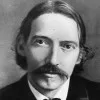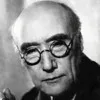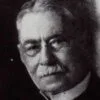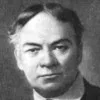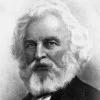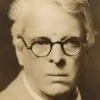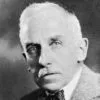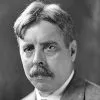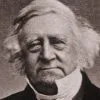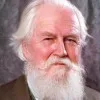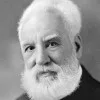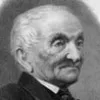THE DOCTOR: It’s very, very old. Perhaps even older.
Marc Platt (b. 1953) British novelist and playwright
Doctor Who (1963), 26×02 “Ghost Light,” Part 2 (1989-10-11)
(Source)
Quotations about:
age
Note not all quotations have been tagged, so Search may find additional quotes on this topic.
Let no one delay to study philosophy while he is young, and when he is old let him not become weary of the study; for no man can ever find the time unsuitable or too late to study the health of his soul. And he who asserts either that it is not yet time to philosophize, or that the hour is passed, is like a man who should say that the time is not yet come to be happy, or that it is too late.
[Μήτε νέος τις ὢν μελλέτω φιλοσοφεῖν, μήτε γέρων ὑπάρχων κοπιάτω φιλοσοφῶν: οὔτε γὰρ ἄωρος οὐδείς ἐστιν οὔτε πάρωρος πρὸς τὸ κατὰ ψυχὴν ὑγιαῖνον. ὁ δὲ λέγων ἢ μήπω τοῦ φιλοσοφεῖν ὑπάρχειν ἢ παρεληλυθέναι τὴν ὥραν ὅμοιός ἐστι τῷ λέγοντι πρὸς εὐδαιμονίαν ἢ μήπω παρεῖναι τὴν ὥραν ἢ μηκέτι εἶναι τὴν ὥραν.]
Diogenes Laërtius (fl. 3rd C AD) Greek biographer [Διογένης Λαέρτιος]
Lives and Opinions of Eminent Philosophers, Book 10, “Epicurus,” sec. 122 (3rd C AD) [tr. Yonge (1915), ch. 27]
(Source)
Letter from Epicurus to Menoeceus. (Source (Greek)). Other translations:Let no Man that is Young delay the Study of Philosophy, nor when he is Old, be weary of Philosophers. For no Man can be too early, nor no Man past his Time, in what concerns the Health of the Soul. For he that says, 'tis not yet time to study Philosophy, or that he has past his time, is like to him who says, that the time to attain Happiness is past, or is not yet come.
[tr. Kippmax (1696)]Let no one be slow to seek wisdom when he is young nor weary in the search thereof when he is grown old. For no age is too early or too late for the health of the soul. And to say that the season for studying philosophy has not yet come, or that it is past and gone, is like saying that the season for happiness is not yet or that it is now no more.
[tr. Hicks (Loeb) (1925), sec. 122]No one is to delay studying philosophy in their youth or to weary of it in old age. For no one is either too young or too old to be healthy of soul. Anyone who says it's either too soon or too late to study philosophy is like someone who says it's too soon or too late for happiness.
[tr. White (2020), sec. 122]
Nothing flourishes for ever; each generation gives place to its successor.
[Nihil enim semper floret; aetas succedit aetati.]
Marcus Tullius Cicero (106-43 BC) Roman orator, statesman, philosopher
Philippics [Philippicae; Antonian Orations], No. 11, ch. 15 / sec. 39 (11.15/11.39) (43-02 BC) [ed. Harbottle (1897)]
(Source)
(Source (Latin)). Other translations:For there is nothing which flourishes for ever. Age succeeds age.
[tr. Yonge (1903)]For nothing is for ever flourishing; age succeeds to age.
[tr. Ker (Loeb) (1926)]
A man my age is willing to accept almost anything. After the initial shock of astonishment that comes each morning when I wake up and discover that I’m still alive, I can face the day with an open mind.
The first quarter-century of your life was doubtless lived under the cloud of being too young for things, while the last quarter-century would normally be shadowed by the still darker cloud of being too old for them; and between those two clouds, what small and narrow sunlight illumines a human lifetime!
James Hilton (1900-1954) Anglo-American novelist and screenwriter
Lost Horizon, ch. 8 [High Lama] (1933)
(Source)
The true wisdom is to be always seasonable, and to change with a good grace in changing circumstances. To love playthings well as a child, to lead an adventurous and honourable youth, and to settle when the time arrives, into a green and smiling age, is to be a good artist in life and deserve well of yourself and your neighbour.
Undying hope is co-ruler of the human bosom with infallible credulity. A man finds he has been wrong at every preceding stage of his career, only to deduce the astonishing conclusion that he is at last entirely right.
In short, if youth is not quite right in its opinions, there is a strong probability that age is not much more so.
If you ask your mother whether she knew about Peter Pan when she was a little girl she will say, “Why, of course, I did, child,” and if you ask her whether he rode on a goat in those days she will say, “What a foolish question to ask; certainly he did.” Then if you ask your grandmother whether she knew about Peter Pan when she was a girl, she also says, “Why, of course, I did, child,” but if you ask her whether he rode on a goat in those days, she says she never heard of his having a goat. Perhaps she has forgotten, just as she sometimes forgets your name and calls you Mildred, which is your mother’s name. Still, she could hardly forget such an important thing as the goat. Therefore there was no goat when your grandmother was a little girl. This shows that, in telling the story of Peter Pan, to begin with the goat (as most people do) is as silly as to put on your jacket before your vest.
Of course, it also shows that Peter is ever so old, but he is really always the same age, so that does not matter in the least.J. M. Barrie (1860-1937) Scottish novelist and dramatist [James Matthew Barrie]
The Little White Bird, ch. 14 “Peter Pan,” Scribner’s Magazine, Vol. 32 (1902-10)
(Source)
This book was the first appearance of (a prototype) Peter Pan. This portion of the serial is in ch. 14 of the fully collected novel (1902), and in ch. 2 of the abridged Peter Pan in Kensington Gardens (1906).
If one could recover the uncompromising spirit of one’s youth, one’s greatest indignation would be for what one has become.
[Si l’on pouvait recouvrer l’intransigeance de la jeunesse, ce dont on s’indignerait le plus, c’est de ce qu’on est devenu.]
André Gide (1869-1951) French author, Nobel laureate
The Counterfeiters [Les Faux-monnayeurs], ch. 18 [La Pérouse] (1925) [tr. Bussy (1927)]
(Source)
You need repent none of your youthful vagaries. They may have been over the score on one side, just as those of age are probably over the score on the other. But they had a point; they not only befitted your age and expressed its attitude and passions, but they had a relation to what was outside of you, and implied criticisms on the existing state of things, which you need not allow to have been undeserved, because you now see that they were partial.
I love to stroll down in the old parts of Beverly Hills because I know of old places that have been built for four or five years.
The truth of it is, there is not a more unhappy being than a superannuated idol.
Joseph Addison (1672-1719) English essayist, poet, statesman
Essay (1711-05-24), The Spectator, No. 73
(Source)
The essay in focuses in particular on women who are idolized by coteries of men around them.
Happy that nation, fortunate that age, whose history is not diverting.
Benjamin Franklin (1706-1790) American statesman, scientist, philosopher, aphorist
Poor Richard (1740 ed.)
(Source)
It feels great to be 95. I mean, for those parts of me that still have feeling.
Bob Hope (1903-2003) American comedian, actor, humanitarian (b. Leslie Townes Hope)
“95 Years of Hope,” press kit, joke sheet (1998)
(Source)
It is unclear if Hope originated the joke, or one of his writers, or even if it was something he picked up from elsewhere. It was attributed to him in the profile "The C. E. O. of Comedy," by John Lahr, New Yorker, Vol. 74 (1998-12-21), and included in the posthumously published Bob Hope: My Life in Jokes, "My Nineties: 1993-2003" (2003) [with Linda Hope].
The same joke (updated) was told by Hope as he approached 100, e.g., BBC News, "Bob Hope's One-Liners" (2003-07-28).
There is something irreverent in the speculation, but perhaps the want of power has more to do with the wise resolutions of age than we are always willing to admit. It would be an instructive experiment to make an old man young again and leave him all his savoir. I scarcely think he would put his money in the Savings Bank after all; I doubt if he would be such an admirable son as we are led to expect; and as for his conduct in love, I believe firmly he would out-Herod Herod, and put the whole of his new compeers to the blush.
FEISAL: Young men make wars — and the virtues of war are the virtues of young men — courage and hope for the future. Then old men make the peace, and the vices of peace are the vices of old men — mistrust and caution.
Robert Bolt (1924-1995) English dramatist
Lawrence of Arabia, Part 2, sc. 411 (1962) [with Michael Wilson]
(Source)
Cadfael buckled his saddlebags before him, and mounted a little stiffly, but with plain pleasure. Considerately, Hugh refrained from offering help. Sixty-five is an age deserving of respect and reverence from the young, but those who have reached it do not always like to be reminded.
Ellis Peters (1913-1995) English writer, translator [pseud. of Edith Mary Pargeter, who also wrote under the names John Redfern, Jolyon Carr, Peter Benedict]
Brother Cadfael’s Penance, ch. 2 (1994)
(Source)
Towering is the confidence of twenty-one.
Samuel Johnson (1709-1784) English writer, lexicographer, critic
Letter (1759-01-09) to Bennet Langton [paraphrase]
(Source)
While usually quoted as above, the actual passage reads:When I was as you are now, towering in the confidence of twenty-one, little did I suspect that I should be at forty-nine, what I now am.
Langton was only 14-15 at the time.
The letter is itself misdated (and often mis-cited) as being in 1758 when it was actually written in 1759 (based on Johnson's stated age and other internal evidence).
In James Boswell, The Life of Samuel Johnson, Vol. 1: 1709-1765 (1791).
After a man gits to be 38 years old he kant form enny new habits mutch, the best he kan do is steer hiz old ones.
[Affter a man gets to be 38 years old he can’t form any new habits much; the bet he can do is steer his old ones.]
Josh Billings (1818-1885) American humorist, aphorist [pseud. of Henry Wheeler Shaw]
Josh Billings’ Trump Kards, ch. 6 “Pets” (1874)
(Source)
Yung phools are comparatiff harmless, it iz the old phools that make most ov the trubble in this world.
[Young fools are comparatively harmless; it is the old fools that make most of the trouble in this world.]
Josh Billings (1818-1885) American humorist, aphorist [pseud. of Henry Wheeler Shaw]
Josh Billings’ Trump Kards, ch. 6 “Pets” (1874)
(Source)
Old friends are best. King James used to call for his old shoes; they were easiest for his feet.
John Selden (1584-1654) English jurist, legal scholar, antiquarian, polymath
Table Talk, § 45 “Friends” (1689)
(Source)
When we think of loss we think of the loss, through death, of people we love. But loss is a far more encompassing theme in our life. For we lose not only through death, but also by leaving and being left, by changing and letting go and moving on. And our losses include not only our separations and departures from those we love, but our conscious and unconscious losses of romantic dreams, impossible expectations, illusions of freedom and power, illusions of safety — and the loss of our own younger self, the self that thought it would always be unwrinkled and invulnerable and immortal.
Judith Viorst (b. 1931) American writer, journalist, psychoanalysis researcher
Necessary Losses, Introduction (1986)
(Source)
The uses of a dictionary: at thirteen we look up lewd, licentious, lascivious; at thirty, febrile and inchoate; at fifty, endostosis.
Mignon McLaughlin (1913-1983) American journalist and author
The Neurotic’s Notebook, ch. 10 (1963)
(Source)
The one thing that unifies men in a given age is not their individual philosophies but the dominant problem that these philosophies are designed to solve.
Jacques Barzun (1907-2012) French-American historian, educator, polymath
Romanticism and the Modern Ego, ch. 1 (1943)
(Source)
Man comes to each age of his life as a novice.
[L’homme arrive novice à chaque âge de la vie.]
Nicolas Chamfort (1741-1794) French writer, epigrammist (b. Nicolas-Sébastien Roch)
Products of Perfected Civilization [Produits de la Civilisation Perfectionnée], Part 2 “Characters and Anecdotes [Caractères et Anecdotes],” ch. 12 (1795) [tr. Merwin (1969)]
(Source)
(Source (French)). Alternate translations:Man arrives a novice at every age of life.
[ed. Mathews (1878)]Man reaches each stage in his life as a novice.
[tr. Hutchinson (1902), "The Cynic's Breviary"]A man begins every stage of his life as a novice.
[tr. Parmée (2003), ¶ 422]
Few books can please us throughout life. For some we lose all liking as we grow in age, wisdom, or good sense.
[Peu de livres peuvent plaire toute la vie. Il y en a dont on se dégoûte avec le temps, la sagesse ou le bon sens.]
Joseph Joubert (1754-1824) French moralist, philosopher, essayist, poet
Pensées [Thoughts], ch. 23 “Des Qualités de l’Écrivain [Of the Qualities of Writers],” ¶ 178 (1850 ed.) [tr. Attwell (1896), ¶ 375]
(Source)
(Source (French)). Alternate translations:Few books give life-long pleasure. There are some for which, with the growth of time, wisdom, and good sense, we lose all taste.
[tr. Lyttelton (1899), ch. 22, ¶ 84]
Hail, lady of no light footfall,
And eyes not black, and nose not small,
And lips not dry, and hands not long,
And, truly, not too nice a tongue,
The Formian bankrupt’s paramour.
The Province calls you dainty? Your
Face, and not Lesbia’s, is the rage?
O! dull and undiscerning age![Salve, nec minimo puella naso
nec bello pede nec nigris ocellis
nec longis digitis nec ore sicco
nec sane nimis elegante lingua,
decoctoris amica Formiani.
Ten provincia narrat esse bellam?
Tecum Lesbia nostra comparatur?
O saeclum insapiens et infacetum!]Catullus (c. 84 BC – c. 54 BC) Latin poet [Gaius Valerius Catullus]
Carmina # 43 “To Mamurra’s Mistress” [tr. MacNaghten (1925)]
(Source)
Mamurra, also known as Formianus (from the province of Formiae), was an ally of Caesar, but enemy of Catullus. Catullus devotes a number of his odes to attacking Mamurra or, in a few cases, his mistress (who, in some sources, is named Amiana or Ameana).
The poem is noteworthy both for cateloguing unattractive traits (Roman poetry and art make it clear what was considered attractive), and for the final line in its condemnation of a land that would ever place the unnamed mistress over the beauties of Catullus' beloved Lesbia.
(Source (Latin)). Alternate translations:Though splaw thy feet, and snub thy nose,
Thy fingers short, and unlike sloes
Thine eyes in hue may be;
Thy lip with driv'lling moisture dew'd
Thy language vulgar, manners rude,
Yet, wanton, hail to thee!
And does the province praise thy grace;
And e'en presume thy form and face
With Lesbia to compare?
Then why should I thy charms dispraise
'Mid vulgar fools, in tasteless days,
'Tis useless to be fair.
[tr. Lamb (1821)]Though a decided snub your nose,
Your feet the kind called stumpy,
Your eyes by no means black as sloes,
Your fingers fat and dumpy;
Your lip not peachy soft, your speech
Less aptr to charm than pain us;
Yet still I hail you, mistress frail
Of spendthrift Formianus.
The province, bless its stupid soul!
Is mad about your beauty,
So let me also pay my toll
Of homage and of duty.
But then they say your shape, your grace,
My Lesbia's, mine, surpasses!
Oh woe, to live with such a race
Of buzzards, owls, and asses!
[tr. T. Martin (1861)]Hail, maiden! with nor little nose,
Nor pretty foot, nor jet-black eye,
Nor fingers long, nor mouth e'er dry,
Nor tongue whence pleasing prattle flows.
You spendthrift Formian's heart engage;
And doth the province call you fair,
And Lesbia's charms with yours compare?
O witless and O boorish age!
[tr. Cranstoun (1867)]Hail, fair virgin, a nose among the larger,
Feet not dainty, nor eyes to match a raven,
Mouth scarce tenible, hands not wholly faultless,
Tongue most surely not absolute refinement,
Bankrupt Formian, your declar'd devotion.
Thou the beauty, the talk of all the province?
Thou my Lesbia tamely think to rival?
O preposterous, empty generation!
[tr. Ellis (1871)]Hail, girl who neither nose of minim size
Owns, nor a pretty foot, nor jetty eyes,
Nor thin long fingers, nor mouth dry of slaver
Nor yet too graceful tongue of pleasant flavour,
Leman to Formian that rake-a-hell.
What, can the Province boast of thee as belle?
Thee with my Lesbia durst it make compare?
O Age insipid, of all humour bare!
[tr. Burton (1893)]Hail, girl with nose not the smallest, and with foot not lovely, and with eyes not black, and with fingers not long, and with mouth not dry and with tongue not so very elegant, the wench of the bankrupt Formian. And the province declares you to be lovely? With you our Lesbia is to be compared? O generation witless and unmannerly!
[tr. Smithers (1894)]I greet you, lady, you who neither have a tiny nose, nor a pretty foot, nor black eyes, nor long fingers, nor dry mouth, nor indeed a very refined tongue, mistress of the bankrupt Formiae. Is it you who are pretty, as the Province tells us? is it with you that our Lesbia is compared? O, this age! how tasteless and illbred it is!
[tr. Warre Cornish (1904)]Hail, maid with nose by no means small, foot by no means shapely, eyes by no means of jet, fingers by no means long, mouth by no means dry, speech by no means too refined, friend of the Formian waster. Do the provincials call you beautiful? Do they compare you with my Lesbia? Oh foolish and tasteless age!
[tr. Stuttaford (1912)]Pshaw, little girl, you're much too small,
You've scarcely any nose at all.
Your feet are shapeless, fingers, too,
Your eyes a dull and faded blue.
With lips as parched as last year's peas.
And silly tongue, untaught to please.
They say that Formian calls you fair.
And that they praise you everywhere.
A dull and senseless age -- ah me.
If they could Lesbia's beauty see!
[tr. Stewart (1915)]Thy nose is broad and large thy feet,
Thine eyes are neither dark nor clear,
Thy hands are squat, thy lips unsweet,
Thy language shocks a decent ear.
Thy province swears that thou art fair,
O mistress of a village beau!
Swears thou with Lesbia canst compare;
O tasteless age, thy wits how slow!
[tr. Symons-Jeune (1923)]Good morning, dear lady; your nose is too long,
Your fingers too stumpy, your language too strong.
Your feet are ill shaped, and your lips wet with slobber,
Your eyes pale and dull; and your lover's a robber,
Who won't pay his debts. Yet withal people hold
You a beauty , when you're in the country, I'm told.
To think that dull fools for one instant should dare
Your charms with my Lesbia's face to compare!
[tr. Wright (1926)]Listen, girl: your nose is not too small and
your foot somehow lacks shapeliness, your eyes
are not so bright , your fingers though they should be
are neither long nor graceful , nor can your lips
(mouth dripping) be kissed for love, nor is your speech
soft music.
And this girl is the lady friend
of that debauched citizen Mamurra.
They say that you are lovely (rumours from the provinces)
comparing you with Lesbia.
The times are bad
and this an ignorant generation.
[tr. Gregory (1931)]Greetings, girl! You haven't got much --
Neither small nose, nor a pretty foot,
Dark eyes, or slender hands to touch,
No dry mouth; the way you put
Your phrases isn't neat at all,
Mistress of the bankrupt man
From Formiae -- but Cisalpine Gaul
Says you're lovely, lovelier than
My Lesbia, even? Oh, enough!
This ignorant age -- how rude and rough!
[tr. Hollander (1976)]Greetings ot you, girl of the nose not tiny,
the feet not pretty, eyes not darkly-shadowed,
stubby fat fingers, mouth forever spraying
language that shows us your lack of refinement,
whore of that bankrupt wastrel from Formiae!
Is it your beauty they praise in the province?
Do they compare you to our Lesbia?
Mindless this age. And insensitive, really.
[tr. C. Martin (1979)]Hello, girl, neither with the smallest nose,
Nor with pretty feet nor with black little eyes
Nor with long fingers nor with dry lips
Nor clearly with a very refined tongue.
Girl/friend of the spendthrift from Formiae,
Does the province report that you are beautiful?
Is our Lesbia compared with you?
O tasteless and crude age!
[tr. Drudy (1997)]Greetings, girl with a nose not the shortest,
feet not so lovely, eyes not of the darkest,
fingers not slender, mouth never healed,
and a not excessively charming tongue,
bankrupt Formianus’s ‘little friend’.
And the Province pronounces you beautiful?
To be compared to my Lesbia?
O witless and ignorant age!
[tr. Kline (2001)]Hello, girl without the smallest nose
Nor pretty feet, nor dark eyes
Nor elegant fingers nor dry mouth
Nor language int he least refined
Girlfriend of that bankrupt from Formia.
So country people call you beautiful?!
Our Lesbia is compared with you?!
Oh, what a stupid and tasteless age this is!
[tr. Wikibooks (2017)]Greetings, you girl with neither a little nose,
nor handsome feet, black little eyes
long fingers, a dry mouth,
and truly tongue not exceedingly elegant.
Girlfriend of the bankrupt of Formiae,
does the province say that you are beautiful?
Is our Lesbia compared with you?
Oh foolish and coarse generation!
[tr. Wikisource (2018)]Howdy, girl with the not-small nose,
Feet not beautiful, eyes not black,
Fingers not long, the lips not dry,
A tongue not quite so elegant,
“Friend” of a Formian bankrupt.
The sticks proclaim you’re beautiful?
With you our Lesbia is compared?
O times, unthinking and vulgar!
[tr. @sentantiq (2021)]
Old wine, and an old friend, are good provisions.
George Herbert (1593-1633) Welsh priest, orator, poet.
Jacula Prudentum, or Outlandish Proverbs, Sentences, &c. (compiler), # 136 (1640 ed.)
(Source)
And in truth, of course, I’m not just 60 — I’m twelve, I’m 23, I’m 37, I’m 42, I’m 18. I’m every age I’ve ever been. Depending on what day of the week it is and what the situation calls for at the moment.
[Und in Wahrheit bin ich natürlich nicht nur 60 – ich bin zwölf, ich bin 23, ich bin 37, ich bin 42, ich bin 18. Ich habe jedes Alter, das ich je gehabt habe. Je nachdem, welcher Wochentag ist und was die Situation gerade erfordert.]
William Martin "Billy" Joel (b. 1949) American singer, songwriter, pianist
“Ohne die Nazis hätte es Billy Joel nie gegeben,” Die Welt (2009-05-10)
This interview is published in German, but in it Joel comments he only knows a bit of the language (his father was a Jewish refugee from Germany before WW2), so it was likely conducted in English. The German version is from the article. The English version is from Wikiquote (source unknown), which titles the article "Without the Nazis, there wouldn't have been Billy Joel."
I am old now, or at least, I am no longer young, and everything I see reminds me of something else I’ve seen, such that I see nothing for the first time. A bonny girl, her hair fiery red, reminds me only of another hundred such lasses, and their mothers, and what they were as they grew, and what they looked like when they died. It is the curse of age, that all things are reflections of other things.
Neil Gaiman (b. 1960) British author, screenwriter, fabulist
“The Truth Is a Cave in the Black Mountains …”, Trigger Warning (2015)
(Source)
Youth is not a time of life; it is a state of mind; it is not a matter of rosy cheeks, red lips and supple knees; it is a matter of the will, a quality of the imagination, a vigor of the emotions; it is the freshness of the deep springs of life.
Youth means a temperamental predominance of courage over timidity of the appetite, for adventure over the love of ease. This often exists in a man of sixty more than a boy of twenty. Nobody grows old merely by a number of years. We grow old by deserting our ideals.
Years may wrinkle the skin, but to give up enthusiasm wrinkles the soul. Worry, fear, self-distrust bows the heart and turns the spirit back to dust.
Whether sixty or sixteen, there is in every human being’s heart the lure of wonder, the unfailing child-like appetite of what’s next, and the joy of the game of living.
When the aerials are down, and your spirit is covered with snows of cynicism and the ice of pessimism, then you are grown old, even at twenty, but as long as your aerials are up, to catch the waves of optimism, there is hope you may die young at eighty.
Samuel Ullman (1840-1924) German-American businessman, poet, humanitarian, religious leader
“Youth” (1918)
(Source)
This poem was a favorite of Douglas MacArthur, who had a copy hung in his office in Tokyo, and was responsible for much of the author's subsequent fame in Japan.
But now at thirty years my hair is gray ––
(I wonder what it will be like at forty?
I thought of a peruke the other day)
My heart is not much greener; and, in short, I
Have squander’d my whole summer while ’twas May,
And feel no more the spirit to retort; I
Have spent my life, both interest and principal,
And deem not, what I deem’d, my soul invincible.
The years swarm around me like midges, and though each tiny bite only costs me a single drop of blood, they are so thick I am nearly bled dry.
Stephen L. Burns (b. 1953) American author
“Redeemer’s Riddle,” Sword and Sorceress IV (1987) [ed. Marion Zimmer Bradley]
(Source)
Nothing — so it seems to me — is more beautiful than the love that has weathered the storms of life. The sweet, tender blossom that flowers in the heart of the young — in hearts such as yours — that, too, is beautiful. The love of the young for the young, that is the beginning of life. But the love of the old for the old, that is the beginning of — of things longer.
Jerome K. Jerome (1859-1927) English writer, humorist [Jerome Klapka Jerome]
“Passing of the Third Floor Back” [The Stranger] (1908)
(Source)
I’ve come up with a set of rules that describe our reactions to technologies:
- Anything that is in the world when you’re born is normal and ordinary and is just a natural part of the way the world works.
- Anything that’s invented between when you’re fifteen and thirty-five is new and exciting and revolutionary and you can probably get a career in it.
- Anything invented after you’re thirty-five is against the natural order of things.
Douglas Adams (1952-2001) English author, humorist, screenwriter
The Salmon of Doubt, Part 2 “The Universe” (2002) [ed. Peter Guzzardi]
(Source)
“Pooh, promise you won’t forget about me, ever. Not even when I’m a hundred.”
Pooh thought for a little.
“How old shall I be then?”
“Ninety-nine.”
Pooh nodded.
“I promise,” he said.A. A. Milne (1882-1956) English poet and playwright [Alan Alexander Milne]
The House at Pooh Corner, ch. 10 [Christopher Robin and Pooh] (1928)
(Source)
Possibly the inspiration of the spurious Pooh quotation:If you live to be a hundred, I want to live to be a hundred minus one day, so I never have to live without you.
For more discussion about this and related quotes, see May You All Live Forever. May I Live Forever Less A Day – Quote Investigator®.
When you’re forty, half of you belongs to the past — and when you’re seventy, nearly all of you —
Jean Anouilh (1910-1987) French dramatist
Léocadia [Time Remembered], Act 2, sc. 2 [Duchess] (1939) [tr. Moyes (1955)]
(Source)
My son, young men’s arms are indeed taut for action, but old men’s counsels are better; for time teaches the most subtle lessons.
Euripides (485?-406? BC) Greek tragic dramatist
Bellerophon [Βελλεροφῶν], frag. 291 (TGF) (c. 430 BC) [tr. Collard, Hargreaves, Cropp (1995)]
(Source)
Alternate translation:Son, the hands of young men always itch for action, but the
judgment of the old is sounder.
Time teaches discrimination
[tr. Stevens (2012)]
The course of a man’s life is certain. The path that we follow goes in only one direction. Every mile is distinctly marked with its own peculiar characteristic — the vulnerability of infants, the animal high spirits of adolescents, the seriousness of adults, the maturity of old men — and at each of these stages we must accept gracefully what Nature grants us.
[Cursus est certus aetatis et una via naturae eaque simplex, suaque cuique parti aetatis tempestivitas est data, ut et infirmitas puerorum et ferocitas iuvenum et gravitas iam constantis aetatis et senectutis maturitas naturale quiddam habet, quod suo tempore percipi debeat.]
Marcus Tullius Cicero (106-43 BC) Roman orator, statesman, philosopher
De Senectute [Cato Maior; On Old Age], ch. 10 / sec. 33 (10.33) (44 BC) [tr. Cobbold (2012)]
(Source)
(Source (Latin)). Alternate translations:The cours and the weye of age is certeyne and determyned by nature, whiche hathe onely awey which is symple & is nothyng different more in the one than in the othir. But each go by that symple and determyned wey aftir the degrees in their cours from the one age in to that other. And yet nature had given to every part of age his owne propre season and tyme, and hir pertynent cours of usage in kynde. That is to witt, that sekenesse and maladye is appropryd to the age of puerice in childhode, & cruelte is appropryd to the age of yongth, worshipfulnesse and sadnesse of maners be appropryd to the age of virilite whiche is the fyfthe age. Moderaunce and temperaunce be appropryd to olde age. Eueriche oweth to have sumwhat naturelly and appropryd unto that whiche may be gadird in his tyme.
[tr. Worcester/Worcester/Scrope (1481), Part 3]The race and course of age is certain; and there is but one way of nature and the same simple; and to every part of a man's life and age are given his convenient times and proper tempestivities. For even as weakness and infirmity is incident to young children, lustiness and bravery to young men, and gravity when they come to ripe years; so, likewise the maturity or ripeness of old age have a certain special gift given and attributed to it by nature, which ought not to be neglected, but to be taken in his own time and season when it cometh.
[tr. Newton (1569)]There is but one course of age, and one way of nature, and the same simple, and to every part of age its own timelines is given; for as infirmity belongs to child-hood, fiercenesse to youth, and gravity to age, so the true ripenesse of age hath a certaine natural gravity in it, which ought to be used in it own time.
[tr. Austin (1648)]Simple, and certain Nature's wayes appear,
As she sets forth the seasons of the year.
So in all parts of life we find her truth,
Weakness to childhood, rashness to our youth:
To elder years to be discreet and grave,
Then to old age maturity she gave.
[tr. Denham (1669)]Every Age has something in it, peculiar to it self: as Weakness to our Infancy, an unguided Warmth to Youth, Seriousness to Manhood, and a certain Maturity of Judgment to Old Age, which we may expect to reap the Fruits of, when advanced to it.
[tr. Hemming (1716)]Life has a sure Course, and Nature but one Way, that that too simple and plain. And to every Part of Man's Age a peculiar Propriety of Temper is given: Thus Weakness in Children, a Boldness in Youth, and a Gravity in Manhood appears; and a full Ripeness of Years has always something which seems natural to it, and which ought to be made use of at a proper Time.
[tr. J. D. (1744)]The Stages of Life are fixed; Nature is the same in all, and goes on in a plain and steady Course: Every Part of Life, like the Year, has its peculiar Season: As Children are by Nature weak, Youth is rash and bold; staid Manhood more solid and grave; and so Old-Age in its Maturity, has something natural to itself, that ought particularly to recommend it.
[tr. Logan (1750)]Nature conducts us, by a regular and insensible progression through the different seasons of human life; to each of which she has annexed its proper and distinguishing characteristic. As imbecility is the attribute of infancy, ardour of youth, and gravity of manhood; so declining age has its essential properties, which gradually disclose themselves as years increase.
[tr. Melmoth (1773)]The course of life is fixed, and the path of nature is one, and that simple. And its own proper seasonableness has been given to each division of life; so that both the feebleness of boys and the proud spirit of young men, and the gravity of a now settle period of life, and the maturity of old age, has something natural to it, which ought to be gathered in its own season.
[Cornish Bros. ed. (1847)]There is a definite career in life, and one way of nature, and that a simple one; and to every part ot life its own peculiar period has been assigned: so that both the feebleness of boys, and the high spirit of young men, and the steadiness of now fixed manhood, and the maturity of old age, have something natural, which ought to be enjoyed in their own time.
[tr. Edmonds (1874)]Life has its fixed course, and nature one unvarying way; each age has assigned to it what best suits it, so that the fickleness of boyhood, the sanguine temper of youth, the soberness of riper years, and the maturity of old age, equally have something in harmony with nature, which ought to be made availing in its season.
[tr. Peabody (1884)]The course of life is fixed, and nature admits of its being run but in one way, and only once; and to each part of our life there is something specially seasonable; so that the feebleness of children, as well as the high spirit of youth, the soberness of maturer years, and the ripe wisdom of old age -- all have a certain natural advantage which should be secured in its proper season.
[tr. Shuckburgh (1895)]One only way
Nature pursues, and that a simple one:
To each is given what is fit for him.
The boy is weak: youth is more full of fire:
Increasing years have more of soberness:
And as in age there is a ripeness too.
Each should be garnered at its proper time,
And made the most of.
[tr. Allison (1916)]Life's race-course is fixed; Nature has only a single path and that path is run but once, and to each stage of existence has been allotted its own appropriate quality; so that the weakness of childhood, the impetuosity of youth, the seriousness of middle life, the maturity of old age -- each bears some of Nature's fruit, which must be garnered in its own season.
[tr. Falconer (1923)]The course of life is clear to see; nature has only one path, and it has no turnings. Each season of life has an advantage peculiarly its own; the innocence of children, the hot blood of youth, the gravity of the prime of life, and the mellowness of age all possess advantages that are theirs by nature, and that should be garnered each at its proper time.
[tr. Copley (1967)]Life and nature have but one direction
Easy to take, without correction.
Each of life’s rite of passage dates
Has its own distinguishing traits:
A child’s weakness
A youth’s boldness
An adult’s authority
An old man’s maturity
And each with a certain natural zest
To be reaped when it’s time for its harvest.
[tr. Bozzi (2015)]The course of life cannot change. Nature has but a single path and you travel it only once. Each stage of life has its own appropriate qualities -- weakness in childhood, boldness in youth, seriousness in middle age, and maturity in old age. These are fruits that must be harvested in due season.
[tr. Freeman (2016)]
The child thinks of growing old as an almost obscene calamity, which for some mysterious reason will never happen to itself. All who have pass the age of thirty five are joyless grotesques, endlessly fussing about things of no importance and staying alive without, so far as the child can see, having anything to live for. Only child life is real life.
George Orwell (1903-1950) English journalist, essayist, writer [pseud. of Eric Arthur Blair]
“Such, Such Were the Joys” (1948)
(Source)
Not anything is more responsible for the good old days than the fact that the grownups of one generation always remember the world as it looked to them in their young days, not as it looked to their elders.
Marcelene Cox (1900-1998) American writer, columnist, aphorist
“Ask Any Woman” column, Ladies’ Home Journal (1960-05)
(Source)
If by the age of forty a man is still disliked there is no hope for him.
[年四十而見惡焉、其終也已。]
Confucius (c. 551- c. 479 BC) Chinese philosopher, sage, politician [孔夫子 (Kǒng Fūzǐ, K'ung Fu-tzu, K'ung Fu Tse), 孔子 (Kǒngzǐ, Chungni), 孔丘 (Kǒng Qiū, K'ung Ch'iu)]
The Analects [論語, 论语, Lúnyǔ], Book 17, verse 26 (17.26) (6th C. BC – AD 3rd C.) [tr. Lau (1979)]
(Source)
(Source (Chinese)). Alternate translations:When a man at forty is the object of dislike, he will always continue what he is.
[tr. Legge (1861)]When a man meets with odium at forty, he will do so to the end.
[tr. Jennings (1895)]If a man after forty is an object of dislike to men, he will continue to be so to the end of his days.
[tr. Ku Hung-Ming (1898)]If a man reach forty and yet be disliked by his fellows, he will be so to the end.
[tr. Soothill (1910)]Forty and disliked. He is at the end already; too late to alter.
[tr. Soothill (1910) - alternate 1]At 40 a man's character is settled, and if he still be detested by his fellows, then here his end is reached.
[tr. Soothill (1910) - alternate 2]If a man is hateful at forty he'll be so to the end.
[tr. Pound (1933)]One who has reached the age of forty and is still disliked will be so till the end.
[tr. Waley (1938)]It is all over for the man of forty who is held in aversion.
[tr. Ware (1950), 17.24]If hateful things are seen in one at the age of forty, that is indeed how one will end up.
[tr. Dawson (1993)]Whoever, by the age of forty, is still disliked, will remain so till the end.
[tr. Leys (1997)]If, at forty, a man is still loathed, he is done for.
[tr. Huang (1997), 17.25]If one is still disliked at his forty years of age, one is going to the end.
[tr. Cai/Yu (1998), No. 466]The person who at age forty still evokes the dislike of others is a hopeless case.
[tr. Ames/Rosemont (1998)]If he is forty and is still hated, he will probably be so until the end.
[tr. Brooks/Brooks (1998), 17.24]If you reach forty and find it all hateful, you'll be that way to the death.
[tr. Hinton (1998), 17.25]If, having reached the age of forty, you still find yourself despised by others, you will remain despised until the end of your days.
[tr. Slingerland (2003)]Forty and hated by others -- and he’ll be so the rest of his life.
[tr. Watson (2007)]If a person has reached forty but is still an outcast, he will not have much hope for the rest of his life.
[tr. Li (2020)]
But our machines have now been running for 70. or 80. years, and we must expect that, worn as they are, here a pivot, there a wheel, now a pinion, next a spring, will be giving way: and however we may tinker them up for awhile, all will at length surcease motion. Our watches, with works of brass and steel, wear out within that period.
Thomas Jefferson (1743-1826) American political philosopher, polymath, statesman, US President (1801-09)
Letter (1814-07-05) to John Adams
(Source)
Jefferson (and Adams) lived another 12 years, both dying on 4 July 1826.
Age is no second childhood — age makes plain,
Children we were, true children we remain.[Das Alter macht nicht kindisch, wie man spricht,
Es findet uns nur noch als wahre Kinder.]Johann Wolfgang von Goethe (1749-1832) German poet, statesman, scientist
Faust: a Tragedy [eine Tragödie], Part 1, sc. 2 “Prelude on the Stage” / “Prelude at the Theatre,” l. 212ff [Merryman] (1808-1829) [tr. Luke (1987)]
(Source)
The character is identified as Lustige Person in the original, translated in various English sources as Merryman, Merryfellow, Merry Andrew, Jester, Comedian, and Clown.
Some translations (and this site) include the Declaration, Prelude on the Stage, and Prologue in Heaven as individual scenes; others do not , leading to their Part 1 scenes being numbered three lower.
(Source (German)). Alternate translations:Age makes not childish, as one oft avers;
It finds us still true children merely.
[tr. Priest (1808)]Old age does not make childish, as men say; it only finds us still as true children.
[tr. Hayward (1831)]Age does not make us childish, as folk say,
It finds us genuine children e'en in eld.
[tr. Swanwick (1850)]Age does not make us childish, as they say,
But we are still true children when it finds us.
[tr. Brooks (1868)]Age childish makes, they say, but ’tis not true;
We’re only genuine children still, in Age’s season!
[tr. Taylor (1870)]Old age, not childish, makes the old; but they
Are genuine children of a mellower day.
[tr. Blackie (1880)]Old age not childish makes, whate'er one says;
It only finds us still as very children.
[tr. Latham (1908)]Age does not make us childish, as we're told,
It merely finds we are still young at heart.
[tr. Kaufmann (1961)]They say that age makes people childish;
I say it merely finds us still true children.
[tr. Salm (1962)]Old age does not make childish, as they claim,
It merely finds us genuine children yet.
[tr. Arndt (1976)]Age doesn't make us childish, God knows,
Just finds us the same old children still.
[tr. Greenberg (1992)]They say age makes us childish - but it can
Make truer children of us than before.
[tr. Williams (1999)]Age doesn’t make us childish, as they say,
It finds that we’re still children.
[tr. Kline (2003)]
Your lady friends are ill to see,
All old or ugly as can be,
And in their company you go
To banquet, play, and portico;
This hideous background you prepare
To seem, by contrast, young and fair.[Omnes aut vetulas habes amicas
Aut turpes vetulisque foediores.
Has ducis comites trahisque tecum
Per convivia, porticus, theatra.
Sic formosa, Fabulla, sic puella es.]Martial (AD c.39-c.103) Spanish Roman poet, satirist, epigrammatist [Marcus Valerius Martialis]
Epigrams [Epigrammata], Book 8, epigram 79 (8.79) (AD 94) [tr. Pott & Wright (1921), “The Contrast”]
(Source)
"To Fabulla." (Source (Latin)). Alternate translations:All thy companions aged beldames are,
Or more deform'd than age makes any, far:
These cattle at thy heels thou trail'st always
To public walks, to suppers, and to plays.
'Cause when with such alone we thee compare,
Thou canst be said, Fabulla, young or fair.
[tr. Killigrew (1695)]All the companions of her grace, I'm told,
Are either very plan, or very old.
With these she visits: these she drags about,
To play, to ball, assembly, auctions, rout:
With these she sups: with these she takes the air.
Without such foils is lady dutchess fair?
[tr. Hay (1755)]Old women are thine only friends;
Or rivals, safe as they.
No other face thy face attends,
To table, porch or play.
Fabulla, thus thou beauteous art,
And thus thou still art young.
Oh! solace to my eyes impart;
Or silence to my tongue.
[tr. Elphinston (1782), Book 6, Part 3, ep. 94]All your female friends are either old or ugly; nay, more ugly than old women usually are. These you lead about in your train, and drag with you to feasts, porticoes, and theatres. Thus, Fabulla, you seem handsome, thus you seem young.
[tr. Bohn's Classical (1859)]All the female friends you have are either old crones or ugly, and fouler than old crones. These, as your companions, you conduct and drag about with you through parties, colonnades, theaters. In this way, Fabulla, you are lovely, in this way young.
[tr. Ker (1919)]The friends that old Fabulla owns
Are harridans and ancient crones,
Ill-favored witches, what you will;
These are her constant comrades still
To banquets, theatres, and shows;
So ever fair and young she goes.
[tr. Francis & Tatum (1924), ep. 442]The only female friends she has
Are old or ugly crows.
These she drags along with her
To parties, visits, shows.
So it's no cause for wonder that
Amidst such company
She's young, attractive, beautiful --
Almost a joy to see!
[tr. Marcellino (1968)]Her women friends are all old hags
Or, worse, hideous girls. She drags
Them with her everywhere she goes --
To parties, theaters, porticoes.
Clever Fabulla! Set among
Those foils you shine, even look young.
[tr. Michie (1972)]All your women friends are either old hags or frights uglier than old hags. These are your companions whom you bring with you and trail through dinner parties, colonnades, theaters. In this way, Fabullla, you are a beauty, you are a girl.
[tr. Shackleton Bailey (1993)]With women you keep company
Who are ugly as can be.
These ancient frights you take along
To show off in your social throng.
You hope that we will make compare,
So even you look young and fair.
[tr. Wills (2007)]All your friends are ancient hags
or eyesores uglier than those.
These are the company you drag
to banquets, plays, and porticoes.
Fabulla, when you're seen among
such friends, you're beautiful and young.
[tr. McLean (2014)]
The thousands of possible lives that used to spread out in front of me have snapped shut into one, and all I get is what I’ve got. It’s time to pass on the possibilities, all those deliciously half-open doors, to my children, and drive them to the airports, and wish them bon voyage.
JAQUES: [O]ne man in his time plays many parts,
His acts being seven ages. At first the infant,
Mewling and puking in the nurse’s arms.
Then the whining schoolboy with his satchel
And shining morning face, creeping like snail
Unwillingly to school. And then the lover,
Sighing like furnace, with a woeful ballad
Made to his mistress’ eyebrow. Then a soldier,
Full of strange oaths and bearded like the pard,
Jealous in honor, sudden and quick in quarrel,
Seeking the bubble reputation
Even in the cannon’s mouth. And then the justice,
In fair round belly with good capon lined,
With eyes severe and beard of formal cut,
Full of wise saws and modern instances;
And so he plays his part. The sixth age shifts
Into the lean and slippered pantaloon
With spectacles on nose and pouch on side,
His youthful hose, well saved, a world too wide
For his shrunk shank, and his big manly voice,
Turning again toward childish treble, pipes
And whistles in his sound. Last scene of all,
That ends this strange eventful history,
Is second childishness and mere oblivion,
Sans teeth, sans eyes, sans taste, sans everything.William Shakespeare (1564-1616) English dramatist and poet
As You Like It, Act 2, sc. 7, l. 149ff (2.7.149-173) (1599)
(Source)
Feignlove, half-starved, a rich old hag has wed: —
Poor Feignlove, doom’d to earn his board in bed.[Duxerat esuriens locupletem pauper anumque:
Uxorem pascit Gellius et futuit.]Martial (AD c.39-c.103) Spanish Roman poet, satirist, epigrammatist [Marcus Valerius Martialis]
Epigrams [Epigrammata], Book 9, epigram 80 (9.80) (AD 94) [tr. Halhead (1793)]
(Source)
(Source (Latin)). Alternate translations:An old rich wife starv'd Gellius, bare and poor,
Did wed: so she cramm'd him and he cramm'd her.
[tr. Fletcher (c. 1650)]Consorted wealth and age has Gellius won:
Now Gellius earns, and eats, and is undone.
[tr. Elphinston (1782), Book 12, ep. 189]The poor and hungry Gellius married a woman old and rich. He eats and enjoys himself.
[tr. Bohn's Classical (1859)]Hungry, and a pauper, Gellius married a rich and old woman. He now feeds and tickles his wife.
[tr. Ker (1919)]Poor John in his youth was so very sharp-set,
He married a grand dame for what he could get.
To-day he discovers there's plenty to do;
For he has both to feed her and fondle her, too.
[tr. Pott & Wright (1921), "A Bad Bargain"]A hungry pauper, Gellius married a rich old woman. He feeds his wife and fucks her.
[tr. Shackleton Bailey (1993)]She was rich and lonely.
A hungry man was he.
Now he dines and gets his fill,
And, later, so does she.
[tr. Ericsson (1995)]A starving pauper wed a wealthy crone.
Gellius feeds his wife and gives her the bone.
[tr. McLean (2014)]
John Quincy Adams is well, sir; quite well, I thank you. But the house in which he lives at the present time is becoming dilapidated. It’s tottering upon its foundations. Time and the seasons have nearly destroyed it. Its roof is pretty well worn out. Its walls are much shattered and tremble with every wind. The old tenement is becoming almost uninhabitable, and I think John Quincy Adams will have to move out of it soon. But he himself is quite well, sir; quite well.
John Quincy Adams (1767-1848) US President (1825-29)
(Attributed)
(Source)
When, at eighty years old, he was asked by a passer-by on the street, "How is John Quincy Adams today?" The anecdote is found with some frequency c. 1900, about fifty years after Adams' death in 1848, at that age.
A man has more character in his face at forty than at twenty. He has suffered longer, and the more love, the more suffering, the more character.
Mae West (1892-1980) American film actress
Goodness Had Nothing To Do With It, ch. 21 (1959)
(Source)
Fortunate are those who recognize the divine importance of youth’s cocksureness and conceit, and yet know how, gently and appreciatively, to temper it with the riper judgment of added years.
Bruce Barton (1886-1967) American author, advertising executive, politician
More Power to You, ch. 27 (1917)
(Source)
Old Boys have their Playthings as well as young Ones; the Difference is only in the Price.
The young know how old age should be; the old how youth should have been.
Paul Eldridge (1888-1982) American educator, novelist, poet
Maxims for a Modern Man, #139 (1965)
(Source)
To be a poet at twenty is to be twenty; to be a poet at forty is to be a poet.
[Écrire des vers à vingt ans, c’est avoir vingt ans. En écrire à quarante, c’est être poète.]
Eugène Delacroix (1799-1863) French painter [Ferdinand Victor Eugène Delacroix]
(Attributed)
A review of English sources shows nearly all attributions of this quotation are to Delacroix, albeit without citation to where/when he said or wrote it.
There are some references attributing it to French poet Charles Péguy (1873-1914), e.g., Daniel Halevy's study of Péguy, Péguy and Les Cahiers de la Quinzaine, ch. 12, epigraph (1940) [tr. Bethell (1947)]), but even there, no actual citation is provided.
A few attributions can also be found to Canadian poet Louis Dudek (1918-2001).
A review of French sources show the quotation widely attributed to French author Francis Carco (1886-1958), but, again, I cannot find any actual citations of when or where Carco may have said or written that.
Life can be confusing. Good God, and how. Sometimes it seems like the older I get, the more confused I become. That seems ass-backwards. I thought I was supposed to be getting wiser. Instead, I just keep getting hit over the head with my relative insignificance in the greater scheme of the universe. Confusing, life.
But it beats the hell out of the alternative.
Some free advice for you: Never fight an old man. They’ve been there, done that, written the book, made and starred in the movie, designed the T-shirt, and they’ve got no ego at all about how the fight gets won.
I am not ready to die,
But I am learning to trust death
As I have trusted life.
I am moving
Toward a new freedom
Born of detachment,
And a sweeter grace —
Learning to let go.May Sarton (1912-1995) Belgian-American poet, novelist, memoirist [pen name of Eleanore Marie Sarton]
“Gestalt at Sixty,” sec. 3 (1972)
(Source)
Monsieur, my son is twenty-two years old. If he had not become a Communist at twenty-two, I would have disowned him. If he is still a Communist at thirty, I will do it then.
Georges Clemenceau (1841–1929) French statesman, physician, journalist
(Attributed)
Response to someone who was alarmed about his son being a Communist, as attributed in Bennett Cerf, Try and Stop Me (1944).
This may be the source of the quote also attributed to Clemenceau, “Any man who is not a socialist at age twenty has no heart. Any man who is still a socialist at age forty has no head.” Later, George Seldes attributed to David Lloyd George: "A young man who isn’t a socialist hasn’t got a heart; an old man who is a socialist hasn’t got a head.” François Guizot in the mid-19th Century was said to have said, “Not to be a republican at twenty is proof of want of heart; to be one at thirty is proof of want of head.”
The earliest version of this comes from a public letter by Anselme Polycarpe Batbie (1828-1887), who attributed this to Edmund Burke: "Anyone who is not a republican at twenty casts doubt on the generosity of his soul; but he who, after thirty years, perseveres, casts doubt on the soundness of his mind. [Celui qui n’est pas républicain à vingt ans fait douter de la générosité de son âme; mais celui qui, après trente ans, persévère, fait douter de la rectitude de son esprit.]" This has not been found in Burke's writings.
Variants have also been attributed to Benjamin Disraeli, Dean Inge, George Bernard Shaw, Winston Churchill, Otto von Bismarck, and Bertrand Russell.
Further discussion of this quotation:
Popular art is normally decried as vulgar by the cultivated people of its time; then it loses favour with its original audience as a new generation grows up; then it begins to merge into the softer lighting of “quaint” and cultivated people become interested in it, and finally it begins to take on the archaic dignity of the primitive.
Northrop Frye (1912-1991) Canadian literary critic and literary theorist
Anatomy of Criticism, “Mythical Phase: Symbol as Archetype” (1957)
(Source)
At twenty, men love women; at forty, girls; at fifty, themselves.
Minna Antrim (1861-1950) American epigrammatist, writer
Phases, Mazes, and Crazes of Love (1904)
(Source)
After a certain number of years, our faces become our biographies. We get to be responsible for our faces.
Cynthia Ozick (b. 1928) American writer
Interview by Tom Teicholz, Paris Review, “The Art of Fiction” #95 (Spring 1987)
(Source)
See Camus and Orwell.
Discussion of similar quotations: When You Are Young, You Have the Face Your Parents Gave You. After You Are Forty, You Have the Face You Deserve – Quote Investigator.
At fifteen you had the radiance of early morning, at twenty you will begin to have the melancholy brilliance of the moon, and when you are my age you will give out, as I do, the genial golden warmth of 4 P.M.
F. Scott Fitzgerald (1896-1940) American writer [Francis Scott Key Fitzgerald]
This Side of Paradise, Book 1, ch. 3 [Darcy] (1920)
(Source)
You seem a youth to look upon.
You dyed your hair — and lo,
The locks once whiter than a swan
Are blacker than a crow.
Not everyone can you deceive
And, though you hide the grey,
Yet Proserpine will not believe
But snatch the mask away.[Mentiris iuvenem tinctis, Laetine, capillis,
Tam subito corvus, qui modo sygnus eras.
Non omnes fallis; scit te Proserpina canum
Personam capiti detrahet illa tuo.]Martial (AD c.39-c.103) Spanish Roman poet, satirist, epigrammatist [Marcus Valerius Martialis]
Epigrams [Epigrammata], Book 3, epigram 43 (3.43) (AD 87-88) [tr. Pott & Wright (1921)]
(Source)
Proserpina (the Roman version of Persephone) was the goddess / Queen of the Underworld.
(Source (Latin)). Alternate translations:Thou dy'st thy haire to seeme a younger man,
And turn'st a Crow, that lately wert a Swan.
All are not cousen'd; hels queene knows thee grey.
She'll take the vizor from thy head away.
[tr. May (1629)]Lentinus counterfeits his youth
With periwigs, I trow,
But art thou changed so soon, in truth,
From a swan to a crow?
Though canst not all the world deceive:
Proserpine knows thee gray;
And she'll make bold, without your leave,
To take your cap away.
[tr. Fletcher (1656)]Thou that not many months ago
Wast white as Swan, or driven Snow,
Now blacker far than Aesop's Crow,
Thanks to thy Wig, set’st up for Beau.
Faith Harry, thou'rt i'the wrong box,
Old Age these vain endeavours mocks
And time that knows thou'st hoary locks,
Will pluck thy Mask off with a pox.
[tr. Brown (1699)]Why should’st thou try to hide thy self in youth?
Impartial Proserpine beholds the truth,
And laughing at so find and vain a task,
Will strip thy hoary noddle of its mask.
[tr. Addison (fl. early 18th C)]With tinctur'd locks the dotard youth puts on:
Behold a raven, from but now a swan!
Though cheat'st not all; not her, who rules the dead:
She soon shall pull the mask from off thy head.
[tr. Elphinston (1782), Part 2, ep. 21]Before a swan, behind a crow,
Such self-deceit ne'er did I know.
Ah! cease your arts-- death knows you're grey,
And spite of all will keep his day.
[tr. Hoadley (fl. 18th C) §240]You simulate youth, Lentinus, with your dyed hairs; so suddenly a crow, who were so lately a swan. You do not deceive everyone: Proserpina knows you for a greybeard, she will tear off the masque from your head.
[tr. Amos (1858), ch. 4, ep. 140]Letinus, fain to cheat men's eyes,
You smear your head with umber dyes;
And, late a swan as white as snow,
You've suddenly become a crow.
Is everyone deceived by you?
No, one can tell the genuine hue.
Proserpine knows your hair is grey,
And she will tear that mask away.
[tr. Webb (1879)]You ape youth, Laetinus, with your dyed hair; and you, who were but now a swan, are suddenly become a crow! You will not deceive everyone: Proserpine knows that you are hoary, and will snatch the mask from your head.
[tr. Bohn's Classical (1897)]You pretend you're still youthful by dyeing your hair --
Now a crow, though a swan just of late --
But you don't fool us all, for Proserpina knows,
She'll show up the sham of your pate.
[tr. Nixon (1911)]You falsely ape youth, Laetinus, with dyed hair, so suddenly a raven who were but now a swan. You don't deceive all; Proserpine knows you are hoary: she shall pluck the mask from off your head.
[tr. Ker (1919)]You play the youth with raven hue assumed
But yesterday like swan of Leda plumed.
Not all you cheat; Proserpine knows you grey.
Some day she'll pluck your silly mask away.
[tr. Francis & Tatum (1924)]You wish, Lætinus, to be thought a youth,
And so you dye your hair.
You're suddenly a crow, forsooth:
Of late a swan you were!
You can't cheat all: there is a Lady dread
Who knows your hair is grey:
Proserpina will pounce upon your head,
And tear the mask away.
[tr. Duff (1929)]It's artificial for you to look like a young man
with your dyed hair, suddenly turning into a crow
when just a while ago you were a swan. You won't fool
everyone: Proserpina knows you are white-haired
and she will make you take your mask off.
[tr. Bovie (1970)]You've dyed your hair to mimic youth,
Laetinus. Not so long ago
You were a swan; now you're a crow.
You can't fool everyone. One day
Proserpina, who knows the truth,
Will rip that actor's wig away.
[tr. Michie (1972)]You were a swan, you’re now a crow.
Laetinus, why deceive us so,
With borrowed plumage trying?
The Queen of Shades will surely know
When she slips off your mask below,
In Death there's no more dyeing.
[tr. Pitt-Kethley (1987)]You simulate youth, Laetinus, by dying your hair; so suddenly a raven, who were but now a swan. You don't fool everybody. Proserpina knows your hair is white. She will drag the mask from your head.
[tr. Shackleton Bailey (1993)]You dye your hair, Laetinus, to feign youth --
a swan before, a raven now instead.
You don't fool all. Proserpina can tell
you're gray. She'll pull that mask right off your head.
[tr. McLean (2014)]You counterfeit youth with hair-dye, Laetinus: all of a sudden you're a raven, when just now you were a swan. You don't fool everyone: Proserpina knows you are grey; she will drag the mask from your head.
[tr. Nisbet (2015)]Thou, that not a month ago
Wast white as swan or driven snow,
Now blacker far than Aesop's crow,
Thanks to thy wig, sett'st up for beau:
Faith, Harry, thou'rt i' the wrong box;
Old age these vain endeavours mocks,
And time, that knows thou 'st hoary locks,
Will pluck thy mask off with a pox.
[tr. Browne]Before a swan, behind a crow,
Such self-deceit I ne'er did know.
Ah, cease your arts! Death knows you're grey,
And, spite of all, will have his way.
[tr. Hoadley]
As people age, they confuse changes in themselves with changes in the world, and changes in the world with moral decline — the illusion of the good old days. And so every generation believes that the kids today are degrading the language and taking civilization down with it.
Steven Pinker (b. 1954) Canadian-American cognitive psychologist, linguist, author
The Sense of Style, Prologue (2014)
(Source)
Nothing’s more playful than a young Cat, nor more grave than an old One.
Thomas Fuller (1654-1734) English physician, preacher, aphorist, writer
Gnomologia: Adages and Proverbs (compiler), # 3680 (1732)
(Source)
There is still no cure for the common birthday.
John Glenn (1921-2016) American politician and astronaut
Speech, New Concord, Ohio (20 Feb 1997)
(Source)
Announcing his retirement from the U. S. Senate after his next term would expire the next year.
The years come when the mind, like an old mill, ceases to grind; when weeds grow on the wall; and through every crack and leak in dam and sluice, spouts the useless water.
Yet, when all is said and done, birthdays are mere records of time, not registers of distance. They are chronometers, not speedometers. They tell us how long we have been upon the road, not how far we have travelled.
Using maxims is appropriate for those who are older in age when uttered about things for which they have some experience. Using maxims before one is this age lacks propriety as does story-telling: to speak about what one has no experience in is foolish and uneducated. A sufficient sign of this is that bumpkins especially tend to make up maxims and they easily show them off.
[ἁρμόττει δὲ γνωμολογεῖν ἡλικίᾳ μὲν πρεσβυτέροις, περὶ δὲ τούτων ὧν ἔμπειρός τις ἐστί, ὡς τὸ μὲν μὴ τηλικοῦτον ὄντα γνωμολογεῖν ἀπρεπὲς ὥσπερ καὶ τὸ μυθολογεῖν, περὶ δ᾿ ὧν ἄπειρος, ἠλίθιον καὶ ἀπαίδευτον. σημεῖον δ᾿ ἱκανόν· οἱ γὰρ ἀγροῖκοι μάλιστα γνωμοτύποι εἰσὶ καὶ ῥᾳδίως ἀποφαίνονται.]
Aristotle (384-322 BC) Greek philosopher
Rhetoric [Ῥητορική; Ars Rhetorica], Book 2, ch. 21, sec. 9 (2.21.9) / 1395a.9 (350 BC) [tr. @sentantiq (2018)]
(Source)
(Source (Greek)). Alternate translations:In point of age, the use of maxims befit the old, and should be on those matters of which they have particular experience; so that for one who has not arrived at that stage of life, to use maxims is unbecoming; just it is for him to use fables; and if it be on matters whereof he has no experience, it is absurd, and a mark of ignorance. And the following is a sufficient proof of it, for that the rustics most of all are proverb-mongers, and are ready at uttering them.
[Source (1847)]The employment of maxims becomes him who is rather advanced in life; and particularly as respects subjects about which each happens to be well informed. Since for one not so advanced in age to sport maxims is bad taste, just as it is for him to have recourse to fables: and the ue of them on subjects about which one is ignorant is silly, and argues a want of education. There is a sufficient sign of the truth of this; for the boors of the country are of all other people most fond of hammering out maxims, and set them forth with great volubility.
[tr. Buckley (1850)]The use of maxims is suitable to elderly men, and in regard to subjects with which one is conversant; for sententiousness, like story-telling, is unbecoming in a younger man; while, in regard to subjects with which one is not conversant, it is stupid and shows want of culture. It is token enough of this that rustics are the greatest coiners of maxims, and the readiest to set forth their views.
[tr. Jebb (1873)]The use of maxims is suitable for one who is advanced in years, and in regard to things in which one has experience; since the use of maxims before such an age is unseemly, as also is story-telling; and to speak about things of which one has no experience shows foolishness and lack of education. A sufficient proof of this is that rustics especially are fond of coining maxims and ready to make display of them.
[tr. Freese (1924)]The use of Maxims is appropriate only to elderly men, and in handling subjects in which the speaker is experienced. For a young man to use them is -- like telling stories -- unbecoming; to use them in handling things in which one has no experience is silly and ill-bred: a fact sufficiently proved by the special fondness of country fellows for striking out maxims, and their readiness to air them.
[tr. Roberts (1924)]The use of maxims is suitable for one who is advanced in years, and in regard to things in which one has experience; since the use of maxims before such an age is unseemly, as also is story-telling; and to speak about things of which one has no experience shows foolishness and lack of education. A sufficient proof of this is that rustics especially are fond of coining maxims and ready to make display of them.
[tr. Freese (1926)]It is fitting for someone more advanced in age to speak in maxims, and about things he has experience of, since it is inappropriate for someone not of that age to speak in maxims, just as it also to tell myths, and to do so about things he is inexperienced in, this being a mark of foolishness and lack of education. There is a sufficient sign of this: country bumpkins are the ones most given to uttering maxims ....
[tr. Bartlett (2019)]
Two things have always been true about human beings. One, the world is always getting better. Two, the people living at that time think it’s getting worse. It’s because you get older, your responsibilities are different. Now I’m taking care of children instead of being a child. It makes the world look scarier. That happens to everyone.
Penn Jillette (b. 1955) American stage magician, actor, musician, author
“Honest Questions with Penn Jillette,” Interview by Glen Beck, CNN (2 Nov 2007)
(Source)
Wisdom is by far the greatest part of joy,
and reverence toward the gods must be safeguarded.
The mighty words of the proud are paid in full
with mighty blows of fate, and at long last
those blows will teach us wisdom.[πολλῷ τὸ φρονεῖν εὐδαιμονίας
πρῶτον ὑπάρχει. χρὴ δὲ τά γ᾽ εἰς θεοὺς
μηδὲν ἀσεπτεῖν. μεγάλοι δὲ λόγοι
μεγάλας πληγὰς τῶν ὑπεραύχων
ἀποτίσαντες
γήρᾳ τὸ φρονεῖν ἐδίδαξαν.]Sophocles (496-406 BC) Greek tragic playwright
Antigone, l. 1348ff [Chorus] (441 BC) [tr. Fagles (1982), l. 1466ff]
(Source)
Final lines of the play. Original Greek. Alternate translations:Wisdom is first of the gifts of good fortune:
'Tis a duty, to be sure, the rites of the Gods
Duly to honor: but words without measure, the
Fruit of vain-glory, in woes without number their
Recompense finding,
Have lesson'd the agéd in wisdom.
[tr. Donaldson (1848)]Of happiness the chiefest part
Is a wise heart:
And to defraud the gods in aught
With peril's fraught.
Swelling words of high-flown might
Mightily the gods do smite.
Chastisement for errors past
Wisdom brings to age at last.
[tr. Storr (1859)]Wise conduct hath command of happiness
Before all else, and piety to Heaven
Must be preserved. High boastings of the proud
Bring sorrow to the height to punish pride: --
A lesson men shall learn when they are old.
[tr. Campbell (1873)]Wisdom is provided as the chief part of happiness, and our dealings with the gods must be in no way unholy. The great words of arrogant men have to make repayment with great blows, and in old age teach wisdom.
[tr. Jebb (1891)]Wisdom alone is man's true happiness.
We are not to dispute the will of heaven;
For ever are the boastings of the proud
By the just gods repaid, and man at last
Is taught to fear their anger and be wise.
[tr. Werner (1892)]Wisdom is the supreme part of happiness; and reverence towards the gods must be inviolate. Great words of prideful men are ever punished with great blows, and, in old age, teach the chastened to be wise.
[tr. Jebb (1917)]There is no happiness where there is no wisdom;
No wisdom but in submission to the gods.
Big words are always punished
And proud men in old age learn to be wise.
[tr. Fitts/Fitzgerald (1939), l. 1039ff]Of happiness the crown
And chiefest part
Is wisdom, and to hold
The gods in awe.
This is the law
That, seeing the stricken heart
Of pride brought down,
We learn when we are old.
[tr. Watling (1947), Exodos, l. 1027ff]Our happiness depends
on wisdom all the way.
The gods must have their due.
Great words by men of pride
bring greater blows upon them.
So wisdom comes to the old.
[tr. Wyckoff (1954)]Of happiness, far the greatest part is wisdom,
and reverence towards the gods.
Proud words of arrogant man, in the end,
Meet punishment, great as his pride was great,
Till at last he is schooled in wisdom.
[tr. Kitto (1962)]Wisdom is supreme for a blessed life,
And reference for the gods
Must never cease. Great words, sprung from arrogance.
Are punished by great blows.
So it is one learns, in old age, to be wise.
[tr. Woodruff (2001)]By far is having sense the first part
of happiness. One must not act impiously toward
what pertains to gods. Big words
of boasting men,
paid for by big blows,
teach having sense in old age.
[tr. Tyrell/Bennett (2002)]The most important thing in man’s happiness is good judgement and he must not treat with disdain the works of the gods.
The arrogant pay for their big proud words with great downfalls and it’s only then, in their old age that they gain wisdom!
[tr. Theodoridis (2004)]The most important part of true success
is wisdom -- not to act impiously
towards the gods, for boasts of arrogant men
bring on great blows of punishment --
so in old age men can discover wisdom.
[tr. Johnston (2005)]Knowledge truly is by far the most important part of happiness, but one must neglect nothing that the gods demand. Great words of the over-proud balanced by great falls taught us knowledge in our old age.
[tr. Thomas (2005)]
The innocent and the beautiful
Have no enemy but time.William Butler Yeats (1865-1939) Irish poet and dramatist
“In Memory of Eva Gore-Booth and Con Markiewicz” (1927)
(Source)
Age is truly a time of heroic helplessness. One is confronted by one’s own incorrigibility. I am always saying to myself, “Look at you, and after a lifetime of trying.” I still have the vices that I have known and struggled with — well it seems like since birth. Many of them are modified, but not much. I can neither order nor command the hubbub of my mind.
Florida Scott-Maxwell (1883-1979) American-British playwright, author, psychologist
The Measure of My Days (1968)
(Source)
CHORUS: It won’t do you any harm, my Lord, to listen to him and see if what he says is wise. And you, too Haemon. Because both of you spoke well.
CREON: At our age? Should we allow a young little rooster to teach us wisdom?
HAEMON: Justice only. Young or old, one does not look at years but deeds.
ΧΟΡΟΣ: ἄναξ, σέ τ᾽ εἰκός, εἴ τι καίριον λέγει,
μαθεῖν, σέ τ᾽ αὖ τοῦδ᾽: εὖ γὰρ εἴρηται διπλῇ.ΚΡΈΩΝ: οἱ τηλικοίδε καὶ διδαξόμεσθα δὴ
φρονεῖν ὑπ᾽ ἀνδρὸς τηλικοῦδε τὴν φύσιν.ΑἽΜΩΝ: μηδὲν τὸ μὴ δίκαιον: εἰ δ᾽ ἐγὼ νέος,
οὐ τὸν χρόνον χρὴ μᾶλλον ἢ τἄργα σκοπεῖν.Sophocles (496-406 BC) Greek tragic playwright
Antigone, l. 724ff (441 BC) [tr. Theodoridis (2004)]
(Source)
(Source (Greek)). Alternate translations:CHORUS: Sire, thou shouldst learn where he has hit the mark:
Thou too from him: for both have spoken well.
KREON: And shall we, in our riper age, receive
Lessons in prudence from his youthful mind?
HÆMON: Is nought but what is just. If I am young,
'Tis meet to scan my purpose, not my years.
[tr. Donaldson (1848)]CHORUS: If he says aught in season, heed him, King.
Heed thou thy sire too; both have spoken well.
CREON: What, would you have us at our age be schooled,
Lessoned in prudence by a beardless boy?
HAEMON: I plead for justice, father, nothing more.
Weigh me upon my merit, not my years.
[tr. Campbell (1873)]CHORUS: My lord, 'twere wise, if thou wouldst learn of him
In reason; and thou, Haemon, from thy sire!
Truth lies between you.
CREON: Shall our age, forsooth,
Be taught discretion by a peevish boy?
HAEMON: Only in what is right. Respects of time
Must be outbalanced by the actual need.
[tr. Storr (1859)]CHORUS: My king, it is right, if he speaks something appropriate, that you should learn from him and that you, in turn, Haemon, should learn from your father. On both sides there have been wise words.
CREON: Men of my age -- are we, then, to be schooled in wisdom by men of his?
HAEMON: Not in anything that is not right. But if I am young, you should look to my conduct, not to my years.
[tr. Jebb (1891)]CHORUS: O King! if right the youth advise, 'tis fit
That thou shouldst listen to hi: so to thee
Should he attend, as best may profit both.
CREON: And have we lived so long, then, to be taught,
At last, our duty by a boy like thee?
HÆMON: Young though I am, I still may judge aright;
Wisdom in action lies and not in years.
[tr. Werner (1892)]CHORUS: Sire, 'tis meet that thou shouldest profit by his words, if he speaks aught in season, and thou, Haemon, by thy father's; for on both parts there hath been wise speech.
CREON: Men of my age -- are we indeed to be schooled, then, by men of his?
HAEMON: In nothing that is not right; but if I am young, thou shouldest look to my merits, not to my years.
[tr. Jebb (1917)]CHORAGOS: You will do well to listen to him, King,
If what he says is sensible. And you, Haimon,
Must listen to your father. -- Both speak well.
CREON: You consider it right for a man of my years and experience
To go to school to a boy?
HAIMON: It is not right
If I am wrong. But if I am young, and right,
What does my age matter?
[tr. Fitts/Fitzgerald (1939)]CHORUS: There is something to be said, my lord, for this point of view,
And for yours as well; there is so much to be said on both sides.
CREON: Indeed! Am I to take lessons at my time of life
From a fellow of his age?
HAEMON: No lesson you need to be ashamed of.
It isn’t a question of age, but of right and wrong.
[tr. Watling (1947), l. 620ff]CHORUS: Lord, if your son has spoken to the point
you should take his lesson. He should do the same.
Both sides have spoken well.
CREON: At my age I'm to school my mind by his?
This boy instructor is my master, then?
HAEMON: I urge no wrong. I'm young, but you should watch
my actions, not my years, to judge of me.
[tr. Wyckoff (1954)]CHORUS: My lord, he has not spoken foolishly;
You each can learn something from the other.
CREON: What? Men of our age go to school again
And take a lesson from a very boy?
HAEMON: If it is worth the taking. I am young,
But think what should be done, not of my age.
[tr. Kitto (1962)]LEADER: You'd do well, my lord, if he's speaking to the point,
to learn from him, and you, my boy, from him.
You are both talking sense.
CREON: So,
men our age, we're to be lectured, are we? --
schooled by a boy his age?
HAEMON: Only in what is right. But if I seem young,
look less to my years and more to what I do.
[tr. Fagles (1982)]CHORUS: Sir, you should learn from him, if he is on the mark.
And you, Haemon, learn from your father. Both sides spoke well.
CREON: Do you really think, at our age,
We should be taught by a boy like him?
HAEMON: No. Not if I am in the wrong. I admit I'm young;
That's why you should look at what I do, not my age.
[tr. Woodruff (2001)]CORYPHAEUS: Lord, it is fair, if he says something to the point, for you to learn,
and in turn for you from him. It has been well said well twice.
CREON: Are we at our age to be taught
in exercising good sense by a man of his age?
HAEMON: Yes, in nothing that is not just. Even if I am young,
you should not see my years more than my deeds.
[tr. Tyrell/Bennett (2002)]CHORUS LEADER: My lord, if what he’s said is relevant,
it seems appropriate to learn from him,
and you too, Haemon, listen to the king.
The things which you both said were excellent.
CREON: And men my age -- are we then going to school
to learn what’s wise from men as young as him?
HAEMON: There’s nothing wrong in that. And if I’m young,
don’t think about my age -- look at what I do.
[tr. Johnston (2005), l. 820ff]CHORUS: My lord, if someone speaks in season, you should learn, and you also, for both sides have spoken well.
CREON: At our age, taught reason by a man so young?
HAEMON: Taught nothing that is not just! If I am young, I do not need more time to study what's right.
[tr. Thomas (2005)]
If you survive long enough, you’re revered — rather like an old building.
Katharine Hepburn (1907-2003) American actress
In Michael Freedland, Katharine Hepburn (1984)
A longer form of this is quoted in Susan Ware, Letter to the World: Seven Women Who Shaped the American Century (1998): "Well, it's just a question of survival. If you survive long enough, you're revered, rather like an old building. The great trick is to get over the middle period. That's the tricky bit."
A variant is found in the Celebrity Register (1986): "If you survive you become a legend. I'm a legend because I've survived over a long period of time. I'm revered rather like an old building."
The good things of youth are strength and beauty, but the flower of age is moderation.
[Ἰσχὺς καὶ εὐμορφίη νεότητος ἀγαθά, γήραος δὲ σωφροσύνη ἄνθος.]
Democritus (c. 460 BC - c. 370 BC) Greek philosopher
Frag. 294 (Diels) [tr. Freeman (1948)]
(Source)
Diels citation: "294. (205 N.)"; ; collected in Joannes Stobaeus (Stobaios) Anthologium IV, 115, 19.
Alternate translations:
- "The good things of youth are strength and beauty; moderation is the flower of age." [Source]
- "Strength and beauty are the blessings of youth; temperance, however, is the flower of old age."
The critic who at forty believes the same things he believed at twenty is either a genius or a jackass.
George Jean Nathan (1892-1958) American editor and critic
The World in Falseface, “Art & Criticism,” #62 (1923)
(Source)
It seems to me you have had enough of life when you have had your fill of all its activities. Little boys enjoy certain things, but older youths to not yearn for these. Young adulthood has its delights, but middle age does not desire them. There are also pleasures of middle age, but these are not sought in old age. And so, just as the pleasures of earlier ages fall away, so do those of old age. When this happens, you have had enough of life, and it is time for you to pass on.
[Omnino, ut mihi quidem videtur studiorum omnium satietas vitae facit satietatem. Sunt pueritiae studia certa: num igitur ea desiderant adulescentes? Sunt ineuntis adulescentiae: num ea constans iam requirit aetas, quae media dicitur? Sunt etiam eius aetatis: ne ea quidem quaeruntur in senectute. Sunt extrema quaedam studia senectutis: ergo, ut superiorum aetatum studia occidunt, sic occidunt etiam senectutis; quod cum evenit, satietas vitae tempus maturum mortis affert.]
Marcus Tullius Cicero (106-43 BC) Roman orator, statesman, philosopher
De Senectute [Cato Maior; On Old Age], ch. 20 / sec. 76 (20.76) (44 BC) [tr. Freeman (2016)]
(Source)
(Source (Latin)). Alternate translations:And he that is full & replete of all the studyes & werkys perteynent to every age he is replete and wery of the tyme of this life so that he doubte not in no wise the deth as it seemyth me rightfully & as I preve it by my self. And note ye for a good advertisement to every man for to bere in remembraunce and for his prouffite. That certayne thyngys be wherin pueryce callid childhode which is the seconde age puttith his studye and his entendyng in thynges accordyng to his agrement. And the adolescente men whiche be undir the thidd age desyren in no wise the thynges and the besynes wherin puerice studyeth and occupyeth. And certeyne thynges be wherin the men studyen & occupyen them in begynnyng of their adolescencye. Also certayne thynges be in whiche yong age whiche is the fourth & the mene age puttith not his studye & besynesse in his precedent ages though the man had employed & occupied hym in the othir first ages which be smaller and of lesse degree. Yong age is callid the age stable & meane by cause that it holdith the meane betwixt adolescence & olde age And cesseth than the man for to do lighe thynges and folyes And as theene or nevir the man is stable & hole in body in witt & undirstōding the thynges and the werkys in whiche yong men studyen and occupye them been suche that olde men rek nevir of it. But namely olde age hath delectacyon in some thynges in his laste dayes wheryn he studyeth and employeth his wittys. How be it thenne that the studyes and the werkys of the fyve first ages dyen and seace in some tyme and seasons they in suche wise seacen and dyen in the besynesse studyes and the werkys of olde age whiche when they lacken in the man than he whiche is full and wery for to lyve in this worlde cometh to that tyme whiche is ripe and covenable for to dye.
[tr. Worcester/Worcester/Scrope (1481)]But, methinks, satiety of all things causeth satiety of life. There are some fantastical and childish plays wherst young children in their childhood delight to play; shall, therefore, young men and tall fellows addict themselves to the same sembably? There are some exercises and affection swherein youthly years to enure themselves: shall the ripe and constant age (which si called the middle age of man) look to play at the same? And if this middle age there are some studies, wills, and appetites which old age careth not for. And there be some studies and exercises belonging and appropriate to old age . And therefore as the pleasure and delight of the studies and exercises in fresher and lustier ages doth in time wear away and come to an end, so doth the studies of old age in continuance and tract of time also die and vanish. And when this pleasuyre and delightful contentation begin in old men once to decrease, then doth satiety of life bring to them a convenable and mature time to die.
[tr. Newton (1569)]Truly me thinks that the satiety of all things makes also a satiety of life. There are certain studies in children, shall young men desire them? there are others in youth, shall age require them? and there be studies in the last age: therefore as the studies of former ages fail, so do the studies of old age, so that when the satiety or fulnesse of life commeth, it bringeth also a fit time for death.
[tr. Austin (1648), ch. 21]Satiety from all things else doth come,
Then life must to it self grow wearisome.
Those Trifles wherein Children take delight,
Grow nauseous to the young man's appetite,
And from those gaieties our youth requires,
To exercise their minds, our age retires.
And when the last delights of Age shall die,
Life in it self will find satietie.
[tr. Denham (1669)]There are in every Stage of Life, peculiar Pleasures and Diversions, in the Pursuit of which we are employed. And as, when Boys, we are tired with such things, as pleased our Infant State, and, when advanced to a riper Age, we still grow weary of our former Diversions; so Old Age itself has its peculiar Enjoyments. Therefore, as all the several Delights, of all our different Ages, decay and grow insipid, those f our latest Years will likewise fail, and make us loath and reject them, till at last, well satisfied with Length of Days, we fall our selves, ass if it were full ripe, and fit to drop into another World.
[tr. Hemming (1716)]'Tis a Rule with me, That the Fulness of all Things makes the Fullness of Life. Children have their Desires; must young people have the same? In some certain Studies delight Youth, must the Middle-aged too require the same? The Middle-aged have their Foibles; but they are not pursued by the Old; but Old Age has also its favourite Amusements of some Sort of other; and as the Studies of former Ages fall off from us, so do those of our Old Age at last fail us: And when that happens, then the fullness of Life brings on the fit and seasonable Moment for Death.
[tr. J. D. (1744)]By living long we come to a Satiety in all things besides and this should naturally lead us to a Satiety of Life itself. Children we see have their particular Diversions; and does Youth, when past Childhood, pursue or desire the same? Youth also has its peculiar Exercises; and does full Manhood require these as before? Or has Old Age the same Inclinations that prevailed in more vigorous Years? We ought then to conclude, That as there is a Succession of Pursuits and Pleasures in the several Stages of Life, the one dying away, as the other advances and takes Place; so in the same Manner are those of Old Age to pass off in their Turn. And when this Satiety of Life has fully ripen'd us, we are then quietly to lie down in Death, as our last Resting-Place, where all Anxiety ends, and Cares and Fears subsist no more.
[tr. Logan (1744)]The distaste with which, in passing through the several stages of our present being, we leave behind us the respective enjoyments peculiar to each; must necessarily, I should think, in the close of its latest period, render life itself no longer desirable. Infancy and youth, manhood and old age, have each of them their peculiar and appropriate pursuits. But does youth regret the toys of infancy, or manhood lament that no longer as a taste for the amusements of youth? The season of manhood has also its suitable objects, that are exchanged for others in old age; and these too, like all the preceding, become languid and insipt in their turn. Now when this state of absolute satiety is at length arrived; when we have enjoyed the satisfactions peculiar to old age, till we have no longer any relish remaining for them; it is then that death may justly be considered as a mature an seasonable event.
[tr. Melmoth (1773)]In every view of it, as seems to me at least, a satiety of all pursuits produces satiety of life. Doubtless there are pursuits peculiar to boyhood; do then young men long for these? There are also pursuits proper to commencing adolescence; does that time of olife which is now settled, and is called middle-age, require them? There are also pursuits that belong to this latter period; those even are not sought after by old age. There are also certain pursuits of old age, which are the last; therefore as the pursuits of the former stages cease, so also to those of old age. And when this has come to pass, satiety of life brings on the ripe time of death.
[Cornish Bros. ed. (1847)]On the whole, as it seems to me indeed, a satiety of all pursuits causes a satiety of life. There are pursuits peculiar to boyhood; do therefore young men regret the loss of them? There are also some of early youth; does that now settled age, which is called middle life, seek after these? There are also some of this period; neither are they looked for by old age. There are some final pursuits of old age; accordingly, as the pursuits of the earlier parts of life fall into disuse, so also do those of old age; and when this has taken place, satiety of life brings on the seasonable period of death.
[tr. Edmonds (1874)]In fine, satiety of life, as it seems to me, creates satiety of pursuits of every kind. There are certain pursuits belonging to boyhood; do grown-up young men therefore long for them? There are others appertaining to early youth; are they required in the sedate period of life which we call middle age? This, too, has its own pursuits, and they are not sought in old age. As the pursuits of earlier periods of life fail, so in like manner do those of old age. When this period is reached, satiety of life brings a season ripe for death.
[tr. Peabody (1884)]As a general truth, as it seems to me, it is weariness of all pursuits that creates weariness of life. There are certain pursuits adapted to childhood: do young men miss them? There are others suited to early manhood: does that settled time of life called "middle age" ask for them? There are others, again, suited to that age, but not looked for in old age. There are, finally, some which belong to old age. Therefore, as the pursuits of the earlier ages have their time for disappearing, so also have those of old age. And when that takes place, a satiety of life brings on the ripe time for death.
[tr. Shuckburgh (1895)]To put it in a word, it seems to me
'Tis weariness of all pursuits that makes
A weary age. We have pursuits as boys,
Do young men want them? Others yet there are
Suited to growing years, are they required
By those who've reached what's termed "the middle age"?
That too enjoys its own, but are they fit
For us old me? We have our own of course,
And as the others end, just so do ours,
And when it happens, weariness of life
Proclaims that ripeness which precedes our death.
[tr. Allison (1916)]Undoubtedly, as it seems to me at least, satiety of all pursuits causes satiety of life. Boyhood has certain pursuits: does youth yearn for them? Early youth has its pursuits: does the matured or so-called middle stage of life need them? Maturity, too, has such as are not even sought in old age, and finally, there are those suitable to old age. Therefore as the pleasures and pursuits of the earlier periods of life fall away, so also do those of old age; and when that happens man has his fill of life and the time is ripe for him to go.
[tr. Falconer (1923)]From a more general point of view, it seems to me that once we have had our fill of all the things that have engaged our interest, we have had our fill of life itself. There are interests that are proper to childhood: does a full-grown man regret their loss? There are interests that belong to early manhood: when we reach full maturity -- what is called “middle age” -- do we look back to them with longing? Middle age itself has its special concerns; even these have lost their attraction for the old. Finally, there are interests peculiar to old age; these fall away, too, just as did those of the earlier years. When this has happened, a sense of the fullness of life tells us that it is time to die.
[tr. Copley (1967)]When we are children, we have childish interests, but do young men miss them? And when we are middle-aged, do we want what young men want? Similarly, old men are not remotely involved in the needs of middle age; they have their own. Therefore we may argue that as the concerns of each earlier stage of life fade away, so eventually do those of old age. And when that happens, we have had enough of life and we are ready for death.
[tr. Cobbold (2012)]Then too, I think I can safely say that when the point arrives where you have had enough of life's pursuits -- this isn't boredom but more a fullness or satisfaction -- then you have also had enough of life. There are certain pursuits of childhood which teenagers don't miss, do they? And stable, middle aged adults don't go running after the pursuits of teens, do they? And there are some interests of our middle years. therefore, just as we do not fear or regret when the pursuits of earlier stages fall away, so too the thinking person does not regret the passing of the interests of old age. And when this happens, the fullness of life brings about the time which is ripe for death.
[tr. Gerberding (2014)]The fulfilment of all desires,
At least it seems to me, kills all life’s bliss,
And childhood certainly requires
Interests that young people do not miss,
And the tastes of youth’s initial stage
Won’t be sought after in middle age
Whose pursuits seem to be cheerless
To those in their elderliness.
Therefore as the previous life’s urges
Will set like the Sun so will old age’s.
Once life has had its fill there comes the day
On which one may suitably pass away.
[tr. Bozzi (2015)]
Age puzzles me. I thought it was a quiet time. My seventies were interesting and fairly serene, but my eighties are passionate. I grow more intense as I age.
Florida Scott-Maxwell (1883-1979) American-British playwright, author, psychologist
The Measure of My Days (1968)
(Source)
In a word, enjoy that blessing while you have it: when it is gone, do not lament it; unless, indeed, young men ought to lament the loss of boyhood, and those a little advanced in age the loss of adolescence.
[Denique isto bono utare, dum adsit, cum absit, ne requiras: nisi forte adulescentes pueritiam, paulum aetate progressi adulescentiam debent requirere.]
Marcus Tullius Cicero (106-43 BC) Roman orator, statesman, philosopher
De Senectute [Cato Maior; On Old Age], ch. 10 / sec. 33 (10.33) (44 BC) [tr. Edmonds (1874)]
(Source)
(Source (Latin)). Alternate translations:Finally I tell the thou oughtist use of the bodily strength as whiche is one of the goodys of nature in the meane tyme whan thou hast them. But whan the goodys of bodily strength ben no more in thee thenne thou shuldist not require it nor aske it save that thou maist saye paraventure that the adolescentys which ben in the third age owghten to desyre & aske after the age of pueryce which is seconde age & by that he is the ferthir from deth. Therfor I tell the Scipion that when men ben somwhat entrid & come within adolescence which is an age fructuouse and profitable they to require it and to aske it. And not puerice called Childhode whiche is withoute availe and profite.
[tr. Worcester/Worcester/Scrope (1481), Part 3]In fine, use and take well in worth this gift of bodily strength while thou hast it, and when it is gone do not desire nor seek to have it again, unless peradventure you will say that all young men ought to wish themselves in their infancy and swathing-bands again, or when they be somewhat further stricken in years and in the maturity or best time of their age, to wish themselves again in their adolescency.
[tr. Newton (1569)]To conclude, use that strength which you have while you have it; but when it is gone, require it not, unlesse you thinke it a seemly thing of young men, to require their child-hood againe, and ancient men their youth.
[tr. Austin (1648)]The force which Nature gives with care retain,
But when decay'd, 'tis folly to complain;
In age to wish for youth is full as vain,
As for a youth to turn a child again.
[tr. Denham (1669)]The Faculties of our Bodies are to be made use of, while we possess them, but not to be lamented, when they have left us; unless you would think it reasonable that Boys should be desirous to become Children, and that those, who are become Men, should be wishing to grow Boys again.
[tr. Hemming (1716)]In short, make use of any Good while you have it, and when it's gone look not for it, unless you think young Men would do right to require Childhood again, or Men in Years their Youth.
[tr. J. D. (1744)]In short, while you have Strength, use it; when it leaves you, no more repine for the want of it, than you did when Lads, that your Childhood was past; or at the Years of Manhood, that you were no longer Boys.
[tr. Logan (1750)]In a word, my friends, make a good use of your youthful vigour so long as it remains; but never let it cost you a sign when age shall have withdrawn it from you; as reasonably indeed might youth regret the loss of infancy, or manhood the extinction of youth.
[tr. Melmoth (1773)]In a word, make use of that good thing while it is present; when it is absent do not regret it; unless, perhaps, young men ought to seek to be boys again; those who have made a little advance in years, to be young men again.
[Cornish Bros. ed. (1847)]In fine, I would have you use strength of body while you have it: when it fails, I would not have you complain of its loss, unless you think it fitting for young men to regret their boyhood, or for those who have passed on a little farther in life to want their youth back again.
[tr. Peabody (1884)]In fine, enjoy that blessing when you have it; when it is gone, don't wish it back -- unless we are to think that young men should wish their childhood back, and those somewhat older their youth!
[tr. Shuckburgh (1895)]Use then the gifts you have:
When gone, regret them not: unless as men
You are to ask for boyhood to return,
When older ask for you: there still must be
A certain lapse of years.
[tr. Allison (1916)]In short, enjoy the blessing of strength while you have it and do not bewail it when it is gone, unless, forsooth, you believe that youth must lament the loss of infancy, or early manhood the passing of youth.
[tr. Falconer (1923)]To sum it up: use the advantages you have while you have them; when they are gone, don’t sit around wishing you could get them back. Or do you think, perhaps, that young men ought to mourn their lost boyhood, and those a bit older their younger days?
[tr. Copley (1967)]Use whatever gifts you have while you have them, and don’t mope after them when they are gone -- unless of course you think that young men should regret their childhood and that those who are getting on should regret their youth.
[tr. Cobbold (2012)]So to put it in a nutshell
Use your own strength and use it well
As long as it lasts and when it is spent
Just forget it unless you should
Think that boyhood regrets childhood
Or that manhood may its decline lament.
[tr. Bozzi (2015)]In short, enjoy the blessing of bodily strength while you have it, but don't mourn when it passes away, any more than a young man should lament the end of boyhood, or a mature man the passing of youth.
[tr. Freeman (2016)]
I want to tell people approaching and perhaps fearing old age that it is a time of discovery. If they say, “Of what?” I can only answer, “We must find out for ourselves, otherwise it wouldn’t be discovery.”
You need to claim the events of your life to make yourself yours. When you truly possess all that you have been and done, which may take some time, you are fierce with reality. When at last age has assembled you together, will it not be easy to let it all go, lived, balanced, over?
Florida Scott-Maxwell (1883-1979) American-British playwright, author, psychologist
The Measure of My Days (1968)
(Source)
It is impossible to divide the past into distinct, clearly defined periods and prove that one age ended and another began in a particular year, such as 476, or 1453, or 1789. Men do not and cannot change their habits and ways of doing things all at once, no matter what happens.
James Harvey Robinson (1863-1936) American historian and educator
An Introduction to the History of Western Europe, ch. 1 “The Historical Point of View” (1902)
(Source)
Youth is full of sunshine and life. Youth is happy, because it has the ability to see beauty. When this ability is lost, wretched old age begins, decay, unhappiness. […] Anyone who keeps the ability to see beauty never grows old.
The crucial task of age is balance, a veritable tightrope of balance; keeping just well enough, just brave enough, just gay and interested and starkly honest enough to remain a sentient human being.
Florida Scott-Maxwell (1883-1979) American-British playwright, author, psychologist
The Measure of My Days (1968)
(Source)
Always it is, that the hearts in the younger men are frivolous,
but when an elder man is among them, he looks behind him
and in front, so that all comes out far better for both sides.[Αἰεὶ δ’ ὁπλοτέρων ἀνδρῶν φρένες ἠερέθονται·
οἷς δ’ ὁ γέρων μετέῃσιν ἅμα πρόσσω καὶ ὀπίσσω
λεύσσει, ὅπως ὄχ’ ἄριστα μετ’ ἀμφοτέροισι γένηται.]Homer (fl. 7th-8th C. BC) Greek author
The Iliad [Ἰλιάς], Book 3, l. 108ff (3.108-110) [Menelaus] (c. 750 BC) [tr. Lattimore (1951)]
(Source)
Alt. trans.:All young men’s hearts are still unstaid; but in those well-weigh'd deeds
An old man will consent to pass things past, and what succeeds
He looks into, that he may know, how best to make his way
Through both the fortunes of a fact, and will the worst obey.
[tr. Chapman (1611), ll. 113-16]And youth itself an empty wavering state:
Cool age advances, venerably wise,
Turns on all hands its deep-discerning eyes;
Sees what befell, and what may yet befall,
Concludes from both, and best provides for all.
[tr. Pope (1715-20)]Young men are ever of unstable mind;
But when an elder interferes, he views
Future and past together, and insures
The compact, to both parties, uninfringed.
[tr. Cowper (1791), ll. 124-27]For the minds of younger men are ever fluctuating; but for those among whom a senior is present, he looks at the same time both backward and forward, in order that the best results may accrue to both parties.
[tr. Buckley (1860)]For young men's spirits are too quickly stirr'd;
But in the councils check'd by rev'rend age,
Alike are weigh'd the future and the past,
And for all int'rests due provision made.
[tr. Derby (1864), ll. 130-34]Young men's minds are light as air, but when an old man comes he looks before and after, deeming that which shall be fairest upon both sides.
[tr. Butler (1898)]Ever unstable are the hearts of the young; but in whatsoever an old man taketh part, he looketh both before and after, that the issue may be far the best for either side.
[tr. Murray (1924), #95]The younger men
are changeable; he in his age among them,
looking before and after, can see clearly
what shall be in the interests of all.
[tr. Fitzgerald (1974), l. 128ff]The minds of the younger men are always flighty,
but let an old man stand his ground among them,
one who can see the days behind, the days ahead --
that is the best hope for peace, for both our armies.
[tr. Fagles (1990), ll. 131-34]Always in fact do the spirits in younger men flutter unsteady;
but with an elder among them, at once the before and the after
he can observe, so that things will become far better for both sides.
[tr. Merrill (2007), ll. 108-110]
She floated away on the riptide of dementia, ultimately a speck on the horizon, waving for as long as she could to her deeply confused children onshore.
Anne Lamott (b. 1954) American novelist and non-fiction writer
Grace (Eventually): Thoughts on Faith, “Mom, Interrupted” (2007)
(Source)
On her mother's Alzheimer's Disease.
So oft as I with state of present time
The image of the antique world compare,
Whereas man’s age was in his freshest prime,
And the first blossom of faire vertue bare,
Such oddes I find twixt those and these which arc,
As that, through long continuance of his course,
Me seemes the world is runne quite out of square
From the first point of his appointed source;
And being once amiss, grows daily worse and worse: […]For that which all men then did vertue call,
Is now cald vice; and that which vice was hight,
Is now hight vertue, and so us’d of all;
Right now is wrong, and wrong that was is right.Edmund Spenser (c. 1552-1599) English poet
The Faerie Queene, Book 5, Proem, st. 1, 4 (1589-96)
(Source)
Beauty is but a lease from nature.
Edward Counsel (fl. 19th C) Australian author, composer
Maxims: Political, Philosophical, and Moral, #541 (2nd ed., 1892)
(Source)
It would seem that in youth we sow our wild oats, in old age our tame anecdotes.
Clifton Fadiman (1904-1999) American critic, lecturer, editor
The Little, Brown Book of Anecdotes, Introduction (1985)
(Source)
The problem [with beauty] is that it’s like being born rich and getting poorer.
JUST DISCOURSE: Do not bandy words with your father, nor treat him as a dotard, nor reproach the old man, who has cherished you, with his age.
Aristophanes (c. 450-c. 388 BC) Athenian comedic playwright
Clouds, ll. 998-999 (423 BC) [tr. Athenian Soc. (1912)]
(Source)
Alt. trans.:
- JUST ΛΟΓΟΣ: "[Learn] not to contradict your father in any thing; nor by calling him Iapetus, to reproach him with the ills of age, by which you were reared in your infancy." [tr. Hickie (1853)]
- RIGHT LOGIC: "Nor dare to reply when your Father is nigh, nor 'musty old Japhet' to call / In your malice and rage that Sacred Old Age which lovingly cherished your youth." [tr. Rogers (1924)]
Beauty is as summer fruits, which are easy to corrupt, and cannot last.
Francis Bacon (1561-1626) English philosopher, scientist, author, statesman
“Of Beauty,” Essays, No. 43 (1625)
(Source)
I reject that whole point of view — that animation is a children’s medium. The way people talk about it is, well, hey, it’s a good thing I have kids, because now I get to see this. Well, hey, no, man! You can just go and see it. There’s no other art form that is defined in such a narrow way. It’s narrow-minded, and I can’t wait for it to die.
Brad Bird (b. 1957) American director, animator and screenwriter [Phillip Bradley Bird]
“How Pixar Conquered the Planet,” The Guardian (12 Nov 2004)
(Source)
There is no “trick” in being young: it happens to you. But the process of maturing is an art to be learned, an effort to be sustained. By the age of fifty you have made yourself what you are, and if is good, it is better than your youth. If it is bad, it is not because you are older, but because you have not grown.
Marya Mannes (1904-1990) American author and critic [pen name "Sec"]
More in Anger: Some Opinions, Uncensored and Unteleprompted (1958)
(Source)
At twenty the will rules; at thirty the intellect; at forty the judgment.
[A los veinte años reina la voluntad, a los treinta el ingenio, a los cuarenta el juicio.]
Baltasar Gracián y Morales (1601-1658) Spanish Jesuit priest, writer, philosopher
The Art of Worldly Wisdom [Oráculo Manual y Arte de Prudencia], § 298 (1647) [tr. Jacobs (1892)]
(Source)
(Source (Spanish)). Alternate translations:At twenty years of age the Will reigns; at thirty the Wit; at fourty, the Judgment.
[Flesher ed. (1685)]At twenty years desire rules us, at thirty, expediency, at forty, judgment.
[tr. Fischer (1937)]When one is twenty, the will reigns; a thirty, the intelligence; at forty, judgment.
[tr. Maurer (1992)]
See also:At 20 years of age the Will reigns; at 30 the Wit; at 40 the Judgment.
[Benjamin Franklin, Poor Richard's Almanack (1741)
When I was a child, I used to talk like a child, and think like a child, and argue like a child, but now I am a man, all childish ways are put behind me.
[Ὅτε ἤμην νήπιος ἐλάλουν ὡς νήπιος ἐφρόνουν ὡς νήπιος ἐλογιζόμην ὡς νήπιος ὅτε γέγονα ἀνήρ κατήργηκα τὰ τοῦ νηπίου.]
The Bible (The New Testament) (AD 1st - 2nd C) Christian sacred scripture
1 Corinthians 13:11 [JB (1966)]
(Source)
(Source (Greek)). Alternate translations:When I was a child, I spake as a child, I understood as a child, I thought as a child: but when I became a man, I put away childish things.
[KJV (1611)]When I was a child, my speech, feelings, and thinking were all those of a child; now that I am an adult, I have no more use for childish ways.
[GNT (1976)]When I was a child, I used to talk like a child, and see things as a child does, and think like a child; but now that I have become an adult, I have finished with all childish ways.
[NJB (1985)]When I was a child, I used to speak like a child, reason like a child, think like a child. But now that I have become a man, I’ve put an end to childish things.
[CEB (2011)]When I was a child, I spoke like a child, I thought like a child, I reasoned like a child. When I became an adult, I put an end to childish ways.
[NRSV (2021 ed.)]
At sixteen I was stupid, confused and indecisive. At twenty-five I was wise, self-confident, prepossessing, and assertive. At forty-five I am stupid, confused, insecure, and indecisive. Who would have supposed that maturity is only a short break in adolescence?
Youth finds no value in the views it disagrees with, but maturity includes discovering that even an opinion contrary to ours may contain a vein of truth we could profitably assimilate to our own views.
Sydney J. Harris (1917-1986) Anglo-American columnist, journalist, author
Pieces of Eight (1982)
(Source)
Youth has its romance, and maturity its wisdom, as morning and spring have their freshness, noon and summer their power, night and winter their repose. Each attribute is good in its own season.
Charlotte Brontë (1816-1855) British novelist [pseud. Currer Bell]
Letter to a young admirer at Cambridge (as Currer Bell) (23 May 1850)
(Source)
Every human being has paid the earth to grow up. Most people don’t grow up. It’s too damn difficult. What happens is most people get older. That’s the truth of it. They honor their credit cards, they find parking spaces, they marry, they have the nerve to have children, but they don’t grow up. Not really. They grow older. But to grow up costs the earth, the earth. It means you take responsibility for the time you take up, for the space you occupy. It’s serious business. And you find out what it costs us to love and to lose, to dare and to fail. And maybe even more, to succeed. What it costs, in truth.
Maya Angelou (1928-2014) American poet, memoirist, activist [b. Marguerite Ann Johnson]
“Maya Angelou, The Art of Fiction No. 119,” Interview with George Plimpton, The Paris Review (Fall 1990)
(Source)
Angelou used the core section (credit cards, parking spaces) a number of times in different interviews.
To you and me
Life is not full; we see
The good days fly
And, ah, how grievously
Their sum doth mount,
Set all to our account;
Why dally we
Who know what life should be?[Nunc vivit necuter sibi, bonosque
Soles effugere atque abire sentit,
Qui nobis pereunt et inputantur.
Quisquam vivere cum sciat, moratur?]Martial (AD c.39-c.103) Spanish Roman poet, satirist, epigrammatist [Marcus Valerius Martialis]
Epigrams [Epigrammata], Book 5, epigram 20 (5.20.11-14) (AD 90) [tr. Pott & Wright (1921)]
The phrase pereunt et imputantur (they [the days] pass by, and are put to our account) is often found on sundials.
"To Julius Martialis." (Source (Latin)).
Alternate translations:Now, to himself, alas! Does neither live,
But sees good suns, of which we are to give
A strict account, set, and march quick away:
Know a man how to live, and does he stay?
[tr. Cowley (1656)]We behold the good suns shine, and pass away; lost are they for ever, yet, nevertheless, they are counted in our reckoning. Is it possible that anyone who knows how to live delays to live accordingly?
[tr. Amos (1858), ch. 3, #14; identified as ep. 21]As it is, neither of us lives for himself, but sees his good days flee from him and vanish; days which are ever being lost to us, and set down to our account. Should any one, then, delay to live, when he knows how?
[tr. Bohn's Classical (1859)]Now neither lives unto himself, alas!
And the good suns we see, that flash and pass
And perish; and the bell that knells them cries,
"Another gone: O when will ye arise?"
[tr. Stevenson (1884)]Today neither lives for himself, and he feels the good days are flitting and passing away, our days that perish and are cored to our account. Does any man, when he knows how to live, delay?
[tr. Ker (1919)]Now neither of us truly lives at all.
Suns rise and set and swell the reckoning. Say,
Does life mean anything? Then live today.
[tr. Francis & Tatum (1924), #230, "To His Cousin"]Now neither lives his life, but he
Marks precious days that pass and flee.
These days are lost, but their amount
Is surely set to our account.
Knowledge the clue to life can give;
Then wherefore hesitate to live?
[tr. Duff (1929)]But as things are now, neither one of us
Lives for himself, while ever glorious
Days slip by unlived, never to come
Again, deducted always from that sum
Allotted us. Why then do we not live,
We who know the joys that life can give?
[tr. Marcellino (1968)]But as it is, we, both and each,
Miss the rich life within our reach,
We watch the good sun speed and set
And the lost day goes down as debt.
Would any man, if he knew how
To live, not do it here and now?
[tr. Michie (1972)]Now, twin lives are not our own.
Our good suns flee & disappear,
Debited, as they die, to us.
Who hesitates that's learned to live?
[tr. Whigham (1987)]We toil too much for others. Days
flicker by and then are billed,
one by one, to our accounts. Since we know
how, let's start really living now.
[tr. Matthews (1992)]We feel our good days slip away and leave us; they are wasted, and put to our account. Does any man, knowing the way to live, defer it?
[tr. Shackleton Bailey (1993)]Now neither lives
his life. We feel our good days flee,
Numbered and spent. Knowing the way
to live, why should a man delay.
[tr. McLean (2014)]As it is now, neither of us lives for his own benefit, each of us can feel his best days slipping away and leaving us behind. They're gone, they've been debited from our account. What kind of person knows how to live, but keeps putting it off?
[tr. Nisbet (2015)]
Life is not living, but living in health.
[Vita non est vivere, sed valere vita est.]
Martial (AD c.39-c.103) Spanish Roman poet, satirist, epigrammatist [Marcus Valerius Martialis]
Epigrams [Epigrammata], Book 6, epigram 70 (6.70.15) (AD 91) [tr. Ker (1919)]
(Source)
(Source (Latin)). Alternate translations:It is not life to live, but to be well.
[tr. Burton (1621)]Not all who live long, but happily, are old.
[tr. Killigrew (1695)]For sense and reason tell,
That life is only life, when we are well.
[tr. Hay (1755)]For life is not to live, but to be well.
[tr. Johnson, in The Rambler, #48, cited to Elphinston (1 Sep 1750)]To brethe can just not dying give:
But, to be well, must be to live.
[tr. Elphinston (1782), 2.115]For life is not simply living, but living in health.
[tr. Amos (1858)]Life consists not in living, but in enjoying health.
[tr. Bohn's Classical (1859)]It is not life to live, but to be well.
[ed. Harbottle (1897)]The blunderer who deems them so,
Misreckons life and much mistakes it,
He thinks 'tis drawing breath -- we know
'Tis health alone that mars or makes it.
[tr. Pott & Wright (1921)]Life is not life, but health is life indeed.
[tr. Francis & Tatum (1924), #310]To live is not just life, but health.
[tr. Shepherd (1987)]Life is not being alive, but being well.
[tr. Shackleton Bailey (1993)]
What do you suppose makes all men look back to the time of childhood with so much regret (if their childhood has been, in any moderate degree, healthy or peaceful)? That rich charm, which the least possession had for us, was in consequence of the poorness of our treasures. That miraculous aspect of the nature around us, was because we had seen little, and knew less. Each increased possession loads us with a new weariness; every piece of new knowledge diminishes the faculty of admiration; and Death is at last appointed to take us from a scene in which, if we were to stay longer, no gift could satisfy us, and no miracle surprise.
John Ruskin (1819-1900) English art critic, painter, writer, social thinker
The Eagle’s Nest, Lecture 5 “The Power of Contentment in Science and Art,” Sec. 82 (22 Feb 1872)
(Source)
When one is too old for love, one finds great comfort in good dinners.
Zora Neale Hurston (1891-1960) American writer, folklorist, anthropologist
Moses, Man of the Mountain, ch. 6 [Mentu] (1939)
(Source)
Men are conservatives when they are least vigorous, or when they are most luxurious. They are conservatives, after dinner, or before taking their rest; when they are sick, or aged: in the morning, or when their intellect or their conscience have been aroused, when they hear music, or when they read poetry, they are radicals.
Ralph Waldo Emerson (1803-1882) American essayist, lecturer, poet
“New England Reformers,” lecture, Boston (1844-03-03), Essays: Second Series (1844)
(Source)
ENOBARBUS: Age cannot wither her, nor custom stale
Her infinite variety; other women cloy
The appetites they feed, but she makes hungry
Where most she satisfies.William Shakespeare (1564-1616) English dramatist and poet
Antony and Cleopatra, Act 2, sc. 2, l. 276ff (2.2.276-279) (1607)
(Source)
Do not go gentle into that good night,
Old age should burn and rave at close of day;
Rage, rage against the dying of the light.Dylan Thomas (1914-1953) Welsh poet and writer
“Do Not Go Gentle into That Good Night” (1947)
(Source)
First published in Botteghe Oscure (Nov 1951).
When you are twenty years old, you will be a peacock; at thirty, a lion; at forty, a camel; at fifty, a serpent; at sixty, a dog; at seventy, a monkey; and at eighty, nothing..
[A los veinte años será pavón; a los treinta, león; a los cuarenta, camello; a los cincuenta, serpiente; a los sesenta, perro; a los setenta, mona; y a los ochenta, nada.]
Baltasar Gracián y Morales (1601-1658) Spanish Jesuit priest, writer, philosopher
The Art of Worldly Wisdom [Oráculo Manual y Arte de Prudencia], § 276 (1647) [tr. Maurer (1992)]
(Source)
(Source (Spanish)). Alternate translations:At twenty years of age a Peacock; at thirty a Lion; at fourty a Camel; at fifty a Serpent; at sixty a Dog; at seventy an Ape; at fourscore nothing at all.
[Flesher ed. (1685)]At twenty a man is a Peacock, at thirty a Lion, at forty a Camel, at fifty a Serpent, at sixty a Dog, at seventy an Ape, at eighty nothing.
[tr. Jacobs (1892)]At twenty, man is a peacock, at thirty a lion, at forty a camel, at fifty a snake, at sixty a dog, at seventy an ape, and at eighty, nothing.
[tr. Fischer (1937)]
But though that first love’s impassioned blindness
Has passed away in colder light,
I still have thought of you with kindness,
And shall do, till our last goodnight.
The ever-rolling silent hours
Will bring a time we shall not know,
When our young days of gathering flowers
Will be an hundred years ago.Thomas Love Peacock (1785-1866) English novelist, satirist, poet, merchant
“Love and Age,” From Gryll Grange (1860)
(Source)
I miss what I had in terms of the speed of memory access. If I needed a word or a fact it was already at my fingertips and now it’s like an arthritic and elderly gentleman has to sit up and go down many, many flights of stairs very slowly and go and rummage in dusty drawers. Eventually he will return four days later, normally at about 1:30 in the morning, and I will sit up and go, “Oh yes! ‘Crepuscular.’ That was the word I was looking for.”
Neil Gaiman (b. 1960) British author, screenwriter, fabulist
“This Much I Know,” The Guardian (2017-08-05)
(Source)
Leave well — even “pretty well” — alone: that is what I learn as I get old.
Edward FitzGerald (1809-1883) English writer, poet, translator
Letter to W. F. Pollock (7 Dec 1869)
(Source)
You can’t go back home to your family, back home to your childhood, back home to romantic love, back home to a young man’s dreams of glory and of fame, back home to exile, to escape to Europe and some foreign land, back home to lyricism, to singing just for singing’s sake, back home to aestheticism, to one’s youthful idea of “the artist” and the all-sufficiency of “art” and “beauty” and “love”, back home to the ivory tower, back home to places in the country, to the cottage in Bermuda, away from all the strife and conflict of the world, back home to the father you have lost and have been looking for, back home to someone who can help you, save you, ease the burden for you, back home to the old forms and systems of things which once seemed everlasting but which are changing all the time — back home to the escapes of Time and Memory.
Thomas Wolfe (1900-1938) American writer
You Can’t Go Home Again, Book 7 “A Wind Is Rising and the Rivers Flow” (1940)
(Source)
When all the world is old, lad,
And all the trees are brown;
And all the sport is stale, lad,
And all the wheels run down;
Creep home, and take your place there,
The spent and maimed among: —
God grant you find one face there,
You loved when all was young.Charles Kingsley (1819-1875) English clergyman, historian, essayist, novelist (pseud. "Parson Lot")
“Water Babies,” Song 2, st. 2 (1863)
(Source)
It used to be a good hotel, but that proves nothing — I used to be a good boy, for that matter. Both of us have lost character of late years.
Mark Twain (1835-1910) American writer [pseud. of Samuel Clemens]
The Innocents Abroad, ch. 57 (1869)
(Source)
Yet somehow our society must make it right and possible for old people not to fear the young or be deserted by them, for the test of a civilization is the way that it cares for its helpless members.
King David and King Solomon
Led merry merry lives,
With many, many lady friends,
And many many wives;
But when old age crept over them —
With many, many qualms! —
King Solomon wrote the Proverbs
And King David wrote the Psalms.
The heart never grows better by age; I fear rather worse; always harder. A young liar will be an old one; and a young knave will only be a greater knave as he grows older.
Lord Chesterfield (1694-1773) English statesman, wit [Philip Dormer Stanhope]
Letter to his son, #225 (17 May 1750)
(Source)
Character contributes to beauty. It fortifies a woman as her youth fades. A mode of conduct, a standard of courage, discipline, fortitude and integrity can do a great deal to make a woman beautiful.
I hate that I’ve become one of those old men who visits a cemetery to be with his dead wife. When I was (much) younger I used to ask Kathy what the point would be. A pile of rotting meat and bones that used to be a person isn’t a person anymore; it’s just a pile of rotting meat and bones. The person is gone — off to heaven or hell or wherever or nowhere. You might as well visit a side of beef.
When you get older you realize this is still the case. You just don’t care. It’s what you have.
Most men spend the best part of their lives making the remaining part wretched.
[La plupart des hommes emploient la meilleure partie de leur vie à rendre l’autre misérable.]
Jean de La Bruyère (1645-1696) French essayist, moralist
The Characters [Les Caractères], ch. 11 “Of Mankind [De l’Homme],” § 102 (11.102) (1688) [tr. Stewart (1970)]
(Source)
(Source (French)). Alternate translations:The greatest part of mankind employ their first years to make their last miserable.
[Bullord ed. (1696)]The greatest part of Mankind imploy their first Years to make their last miserable.
[Curll ed. (1713)]The greatest part of Mankind employ their first Years to make their last miserable. [Browne ed. (1752)]Most men employ the first years of their life in making the last miserable.
[tr. Van Laun (1885)]Most men make use of the first part of their life to render the last part miserable.
[Source]
In youth, the years stretch before one so long that it is hard to realize that they will ever pass, and even in middle age, with the ordinary expectation of life in these days, it is easy to find excuses for delaying what one would like to do but does not want to; but at last a time comes when death must be considered.
W. Somerset Maugham (1874-1965) English novelist and playwright [William Somerset Maugham]
The Summing Up, ch. 3 (1938)
(Source)
As one gets older one doesn’t feel quite so strongly any more, one discovers that everything is always going to be exactly the same with different hats on.
Noël Coward (1899-1973) English playwright, actor, wit
Letter (1959)
(Source)
More frequently paraphrased (as in The Film Daily in 1964): "As one gets older, one discovers everything is going to be exactly the same -- with different hats on."
A truly great book should be read in youth, again in maturity, and once more in old age, as a fine building should be seen by morning light, at noon and by moonlight.
Robertson Davies (1913-1995) Canadian author, editor, publisher
“Too Much, Too Fast,” Peterborough Examiner (Canada) (1962-06-16)
(Source)
When young, we trust ourselves too much, and we trust others too little when old. Rashness is the error of youth, timid caution of age.
Charles Caleb "C. C." Colton (1780-1832) English cleric, writer, aphorist
Lacon: Or, Many Things in Few Words, Vol. 1, § 363 (1820)
(Source)
An awful debility,
A lessened utility,
A loss of mobility
Is a strong possibility.
In all probability
I’ll lose my virility
And you your fertility
And desirability.
And this liability
Of total sterility
Will lead to hostility
And a sense of futility.
So let’s act with agility
While we still have facility,
For we’ll soon reach senility
And lose the ability.
Please stop assuming that longevity and perfect health is always the correct option. No. Sometimes fun costs ya. It just does, you know? And that’s OK, you’re willing to make that purchase. Sammy Davis, Jr. was 64 when he died. Give me 64 Sammy-years, I’ll be happy.
There cannot be mental atrophy in any person who continues to observe, to remember what he observes, and to seek answers for his unceasing hows and whys about things.
The girl that I will marry
Will be like a fine wine
That will become better
A bit every morning.[La fille que j’aimera
Sera comme bon vin
Qui se bonifiera
Un peu chaque matin.]
Sow good services: sweet remembrances will grow from them.
The latter part of a wise man’s life is taken up in curing the follies, prejudices, and false opinions he had contracted in the former.
Jonathan Swift (1667-1745) English writer and churchman
“Thoughts on Various Subjects” (1706)
(Source)
Because inside every old person is a young person wondering what happened.
LADY BRACKNELL: Thirty-five is a very attractive age. London society is full of women of the highest birth who have, of their own free choice, remained thirty-five for years. Lady Dumbleton is an instance in point. To my own knowledge she has been thirty-five ever since she arrived at the age of forty, which was many years ago now.
Oscar Wilde (1854-1900) Irish poet, wit, dramatist
The Importance of Being Earnest, Act 3 (1895)
(Source)
Nothing for preserving the body like having no heart.
To be seventy years young is sometimes far more cheerful and hopeful than to be forty years old.
Oliver Wendell Holmes, Sr. (1809-1894) American poet, essayist, scholar
Reply to an invitation from Maud Howe to Julia Ward Howe’s birthday (1889-05-27)
This is the long form version of the quotation, today usually rendered, "It is better to be seventy years young than forty years old."
Other variants:The first references to this quotation are within the first few months of the event, which argues for its authenticity, including The Unitarian Magazine, Vol. 4, No. 7 (1889-07) and even newspaper blurbs, e.g., 1889-05-30. This last has a more expanded quotation:
- To be seventy years young is sometimes far more cheerful than to be forty years old.
- To feel seventy years young is far more cheerful than to feel forty years old.
- It is possible to be seventy years young, instead of forty years old.
As for your mothers's age, I am bound to believe her own story, but I can only say that to be seventy years young is sometimes far more cheerful and hopeful than to be forty years old.
In a 1910 obituary article for Howe, the story and the full quote are again given.
Howe and Holmes (who was eighty when he gave this) were good friends, and Howe and her daughter Laura frequently visited the elder poet. In Julia Ward Howe, 1819-1910, ch. 23 (1915), a biography of Howe by Laura and another daughter, Maud, it expands the anecdote:The seventieth birthday was a great festival. Maud, inviting Oliver Wendell Holmes to the party, had written, "Mamma will be seventy years young on the 27th, Come and play with her!"
The Doctor in his reply said, "It is better to be seventy years young than forty years old!"
Note that uses the short form, and give at least partial credit to the phrase to Maud.
References to the quotation, or even just to "seventy years young" (crediting it to Holmes) are common in the 1890s (e.g., 1890, 1892, 1894, 1899) and into the new millennium . Emily Bishop titled her 1907 self-help book, The Road to "Seventy Years Young"; or The Unhabitual Way after this phrase (which she used as the epigraph on the title page; ironically, she died in 1916 at age 58). Its appearance (in short form) in Howe's 1915 biography, and (in long form) in the 1919 Bartlett's were at its peak popularity.
Some old women and men grow bitter with age. The more their teeth drop out the more biting they get.
Age is never so old as youth would measure it.
I was walking through Central Park, and I saw an old man smoking. Nothing makes a smoker happier than to see an old person smoking. This guy was ancient, bent over a walker, puffing away. I’m like, “Dude, you’re my hero! Guy your age smoking, man, it’s great.” He goes, “What? I’m 28.”
Little of all we value here
Wakes on the morn of its hundredth year
Without both feeling and looking queer.
In fact, there’s nothing that keeps its youth,
So far as I know, but a tree and truth.Oliver Wendell Holmes, Sr. (1809-1894) American poet, essayist, scholar
Poem (1858-09), “The Deacon’s Masterpiece,” Atlantic Monthly, Vol. 2, No. 4
(Source)
The poem appears in the middle of an installment of "Autocrat of the Breakfast-Table", collected in Autocrat of the Breakfast-Table, ch. 11 (1858).
Beauty loses its relish; the Graces, never: After the longest acquaintance, they are no less agreeable than at first.
Henry Home, Lord Kames (1696-1782) Scottish jurist, agriculturalist, philosopher, writer
Introduction to the Art of Thinking, ch. 4 (1761)
(Source)
To me, fair friend, you never can be old,
For as you were when first your eye I ey’d,
Such seems your beauty still.
Love that has nothing but beauty to keep it in good health is short-lived, and apt to have ague fits.
People who live long, who will drink of the cup of life to the very bottom, must expect to meet with some of the usual dregs.
Benjamin Franklin (1706-1790) American statesman, scientist, philosopher, aphorist
Letter to M. Le Veillard (15 Apr 1787)
(Source)
Since the gleaming expanse on the top of your head,
Marinus, seems painfully wide,
You gather together and spread on the tract
The hairs that remain on each side.
But the breath of the wind promptly blows them about
And straightway the middle space clears.
And long strands so surround the bare waste that you seem
Like a Roundhead ‘twixt two Cavaliers.
Now why not be candid, confess that you’re old,
Meet nature with heart unappalled?
You’ll at least then seem one man: there’s nothing so bad
As a being hirsute and yet bald.[Raros colligis hinc et hinc capillos
Et latum nitidae, Marine, calvae
Campum temporibus tegis comatis;
Sed moti redeunt iubente vento
Reddunturque sibi caputque nudum
Cirris grandibus hinc et inde cingunt:
Inter Spendophorum Telesphorumque
Cydae stare putabis Hermerotem.
Vis tu simplicius senem fateri,
Ut tandem videaris unus esse!
Calvo turpius est nihil comato.]Martial (AD c.39-c.103) Spanish Roman poet, satirist, epigrammatist [Marcus Valerius Martialis]
Epigrams [Epigrammata], Book 10, epigram 83 (10.83) (AD 95, 98 ed.) [tr. Nixon (1911), “A Most Delicate Matter”]
(Source)
"To Marinus." (Source (Latin)). Alternate translations:Your thin-sown hairs on any side
With dextrous care you cull;
And rob your temples of their pride,
To thatch your shining skull.
Repell'd by ev'ry puff of wind,
They take their former stand,
And then your desert poll they bind,
With locks in either hand.
So 'twixt two tuzzy youthful pates,
One Halmyrotes sees.
Throw ridicule no more such baits:
The bare old-man will please.
But, that at length you may seem one,
The shaver quick be call'd;
And let him o'er the remnant run:
Belock'd! oh shame! and bald!
[tr. Elphinston (1782), Book 6, part 2, ep. 17]You collect together a few locks of hair that remain on your temples, and cover with them the wide expanse of your shining bald pate; but no sooner are the locks commanded by the wind than they return to their places; and, as before, they gird, on each side, your naked head; just as if Cidas's statue of the old man were placed between two youths having luxuriant hair. Will you candidly confess your senility? In order that you may appear what you really are, let some barber shave the remnant of your hairs; nothing is more disgraceful than a bald man wearing hair.
[tr. Amos (1858), ch. 4, #138]You collect your straggling hairs on each side, Marinus, endeavouring to conceal the vast expanse of your shining bald pate by the locks which still grow on your temples. But the hairs disperse, and return to their own place with every gust of wind; flanking your bare pole on either side with crude tufts. We might imagine we saw Hermeros of Cydas standing between Spendophorus and Telesphorus. Why not confess yourself an old man? Be content to seem what you really are, and let the barber shave off the rest of your hair. There is nothing more contemptible than a bald man who pretends to have hair.
[tr. Bohn's Classical (1859)]From one side and the other you gather up your scanty locks and you cover, Marinus, the wide expanse of your shining bald scalp with the hair form both sides of your head. But blown about, they come back at the bidding of the wind, and return to themselves and gird your bare poll with big culres on this side and on that. You would think that Hermeros of Cydas is standing between Spendophorus and Telephorus. Will you, please, in simpler fashion confess yourself old, so as after all to appear a single person? Nothing is more unsightly than a bald man covered with hair.
[tr. Ker (1919)]You scrape a few hairs from the side of your head,
So that over your bare-shining baldness they spread;
But blown by the wind they return to their place
And with two big curls your poor naked poll grace.
You’ld think that we had old Silenus in sight
Between young Adonis and Hermaphrodite.
Confess your old age and leave all your head bare:
There’s nothing more ugly than bald men with hair
[tr. Pott & Wright (1921)]Your scattered side-locks to a bunch you train,
And draw a forest to the shining plain.
Then comes the wind, and once again are seen
Two curly masses with a space between.
Spendophorus and Telesphorus you'ld swear
And Hermerotes in the midst were there.
Be one, Marinus; your old age confess;
A bald coot feathered vaunts his ugliness.
[tr. Francis & Tatum (1924), #572 "To One Who Hides His Baldness"]Marinus, you collect your scattered locks from this side and from that, and cover the broad expanse of your shining baldness with hair from your temples. But at the wind's bidding they move and return and are restored to themselves, to surround your bare top with big curls on either side. You would think that Cydas' Hermeros was standing between Spendophorus and Telesphorus. Why not be straightforward and admit to being an old man, so that at least you look like one man? Nothing is uglier than a baldhead with a lot of hair.
[tr. Shackleton Bailey (1993)]Your hairs are carefully disposed
Lest your bald pate should be disclosed.
But winds lift them in wavy drifts,
Moved in a blur of constant shifts.
How can you have so little hair,
Yet have it show up everywhere?
[tr. Wills (2007)]
Autumn is really the best of the seasons: and I’m not sure that old age isn’t the best part of life. But of course, like Autumn, it doesn’t last.
The problem with aging is not that it’s one damn thing after another — it’s every damn thing, all at once, all the time.
What is the meaning of life? That was all — a simple question; one that tended to close in on one with years. The great revelation had never come. The great revelation perhaps never did come. Instead there were little daily miracles, illuminations, matches struck unexpectedly in the dark; here was one. This, that, and the other….
Although my book is intended mainly for the entertainment of boys and girls, I hope it will not be shunned by men and women on that account, for part of my plan has been to try to pleasantly remind adults of what they once were themselves, and of how they felt and thought and talked, and what queer enterprises they sometimes engaged in.
When I was young, I admired clever people. Now that I am old, I admire kind people.
Abraham Joshua Heschel (1907-1972) Polish-American rabbi, theologian, philosopher
(Attributed)
(Source)
Quoted by his student, Harold S. Kushner, in When All You've Ever Wanted Isn't Enough, ch. 3 (1986). Also attributed (without citation) to Milton Steinberg and Oscar Wilde.
Variants:
- "When I was young, I admired clever people. Now that I am older, I admire kind people."
- "When I was young, I used to admire intelligent people; as I grow older, I admire kind people."
There are few things that we so unwillingly give up, even in advanced age, as the supposition that we still have the power of ingratiating ourselves with the fair sex.
[F]or cheerfulness and content are great beautifiers, and are famous preservers of youthful looks, depend upon it.
Charles Dickens (1812-1870) English writer and social critic
Barnaby Rudge, ch. 82 (1841)
(Source)
Often given as "Cheerfulness and contentment are great beautifiers and are famous preservers of youthful looks."
The old — like children — talk to themselves, for they have reached that hopeless wisdom of experience which knows that though one were to cry it in the streets to multitudes, or whisper it in the kiss to one’s beloved, the only ears that can ever hear one’s secret are one’s own.
Age may have one side, but assuredly Youth has the other. There is nothing more certain than that both are right, except perhaps that both are wrong. Let them agree to differ; for who knows but what agreeing to differ may not be a form of agreement rather than a form of difference?
What will you think of pleasures when you no longer enjoy them?
Joseph Joubert (1754-1824) French moralist, philosopher, essayist, poet
Pensées [Thoughts], 1802 entry [tr. Auster (1983)]
(Source)
I could not find an analog in other translations of the Pensées.
There’s no such thing as bad whiskey. Some whiskeys just happen to be better than others. But a man shouldn’t fool with booze until he’s fifty, and then he’s a damn fool if he doesn’t.
Youth is a blunder; Manhood a struggle; Old Age a regret.
Benjamin Disraeli (1804-1881) English politician and author
Coningsby: Or, The New Generation, Book 3, ch. 1 (1844)
(Source)
Time robs us of all, even of memory.
[Omnia fert aetas, animum quoque.]Virgil (70-19 BC) Roman poet [b. Publius Vergilius Maro; also Vergil]
Eclogues [Eclogae, Bucolics, Pastorals], No. 9 “Lycidas and Moeris,” l. 51 (9.51) [Moeris] (42-38 BC) [tr. Fairclough (Loeb) (1916)]
(Source)
(Source (Latin)). Alternate translations:Age all things wasts: the minde too.
[tr. Ogilby (1649)]The rest I have forgot, for Cares and Time
Change all things, and untune my Soul to Rhyme.
[tr. Dryden (1709), ll. 70-71]Ah! age, which pilfers all, not e'en the memory spares!
[tr. Wrangham (1830), l. 60]Age bears away all things, even the mind itself.
[tr. Davidson (1854)]Time carries all -- our memories e'en -- away.
[tr. Calverley (c. 1871)]Time steals everything, memory among the rest.
[tr. Wilkins (1873)]Now memory scarce can aught recall;
The note is lost, the voice, the all.
[tr. King (1882), ll. 901-902]Alas! Old age bears hard on everything;
On memory most.
[tr. Palmer (1883)]Time carries all things, even our wits, away.
[tr. Greenough (1895)]Age bears away all things, even the memory itself.
[tr. Bryce (1897)]Time runs away with all things, the mind too.
[tr. Mackail (1899)]How time wears all things out!
Even the memory.
[tr. Mackail/Cardew (1908)]Ah, time takes all we have, the memory too.
[tr. Williams (1915)]Time bears away
All things, even the mind.
[tr. Royds (1922)]Time carries everything away, even our memory.
[tr. Rieu (1949)]Age robs us of all things,
Even the mind.
[tr. Johnson (1960)]Time bears all away, even memory.
[tr. Day Lewis (1963)]Time takes all we have away from us.
[tr. Ferry (1999)]Time takes away all things, memory too.
[tr. Kline (2001)]
Do not think of knocking out another person’s brains because he differs in opinion from you. It would be as rational to knock yourself on the head because you differ from yourself ten years ago.
Horace Mann (1796-1859) American politician, abolitionist, education reformer
Thoughts (1867)
(Source)
Wives are young men’s mistresses, companions for middle age, and old men’s nurses.
Francis Bacon (1561-1626) English philosopher, scientist, author, statesman
“Of Marriage and Single Life,” Essays, No. 8 (1625)
(Source)
“What do you fear, lady?” he asked.
“A cage,” she said. “To stay behind bars, until use and old age accept them, and all chance of doing great deeds is gone beyond recall or desire.”J.R.R. Tolkien (1892-1973) English writer, fabulist, philologist, academic [John Ronald Reuel Tolkien]
The Lord of the Rings, Vol. 3: The Return of the King, Book 5, ch. 2 “The Passing of the Grey Company” [Aragorn and Eowyn] (1955)
(Source)
SUSAN: Sally, does it ever occur to you that age brings wisdom and greater confidence?
SALLY: Susan, age brings you more to shave.
Steven Moffat (b. 1961) Scottish television writer, producer
Coupling, 01×01 “Flushed” (2000-05-12)
(Source)
If you’re not a liberal when you’re 25, you have no heart. If you’re not a conservative by the time you’re 35, you have no brain.
Winston Churchill (1874-1965) British statesman and author
(Spurious)
This hasn't been found in Churchill's writings, and is generally believed by researchers (and the Churchill Centre) to be spurious. It's also misaligned with the ideological cycle of Churchill's own career.
See Clemenceau for more discussion about this general quotation form.
HENRY: A speaker is but a prater, a rhyme is but a ballad, a good leg will fall, a straight back will stoop, a black beard will turn white, a curled pate will grow bald, a fair face will wither, a full eye will wax hollow, but a good heart, Kate, is the sun and the moon, or rather the sun and not the moon, for it shines bright and never changes but keeps his course truly. If thou would have such a one, take me.
In youth our judgments are obscured by our hopes; in age, by our regrets.
Paul Eldridge (1888-1982) American educator, novelist, poet
Maxims for a Modern Man, #144 (1965)
(Source)






